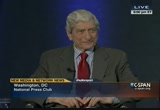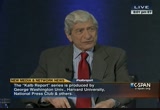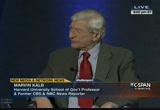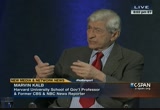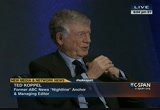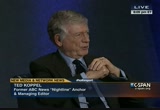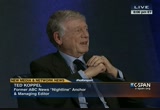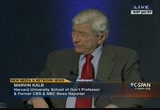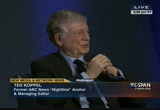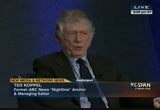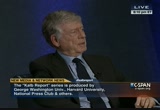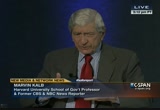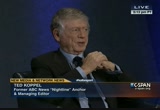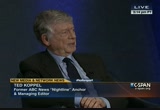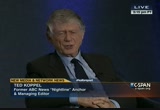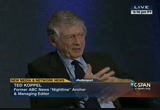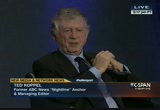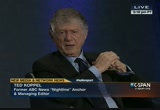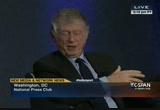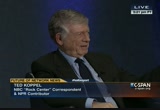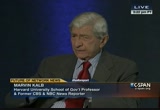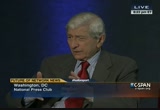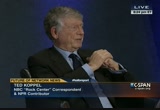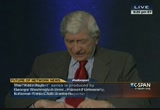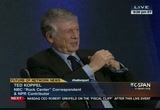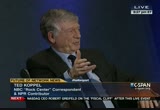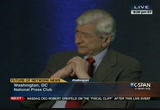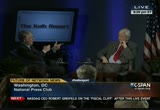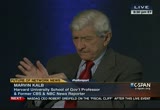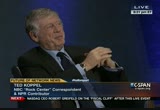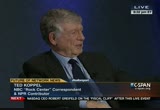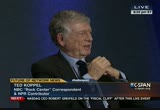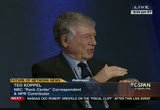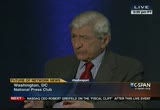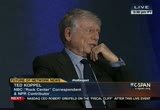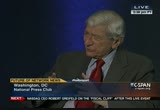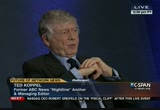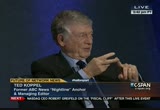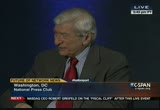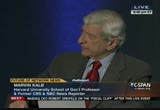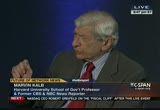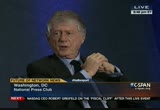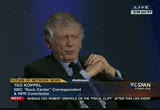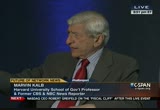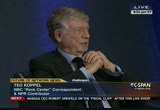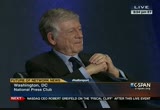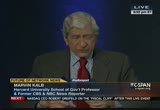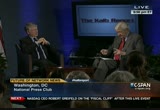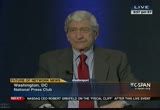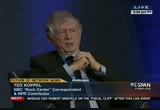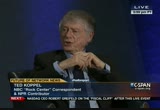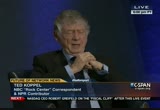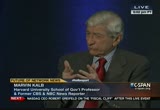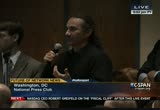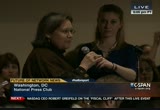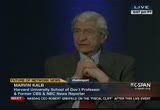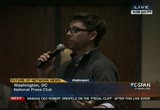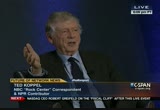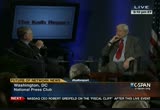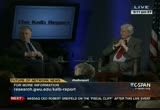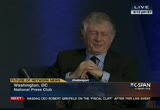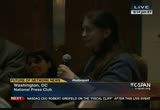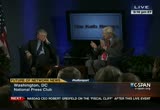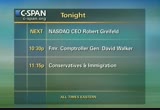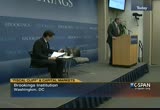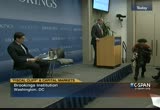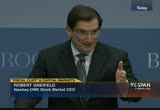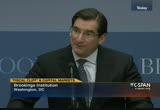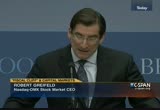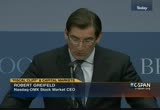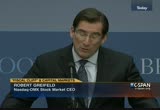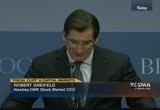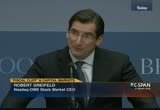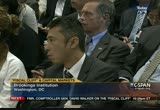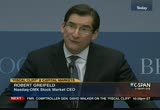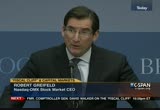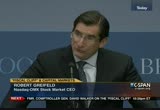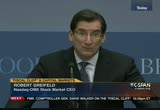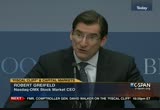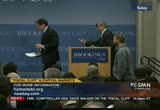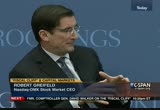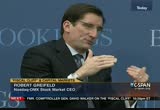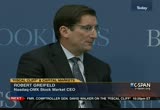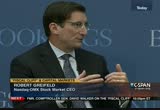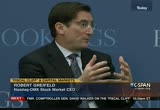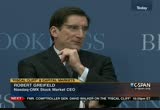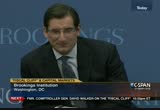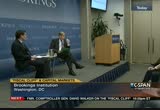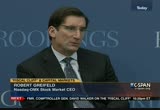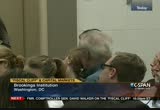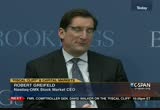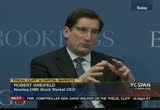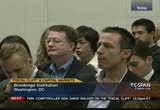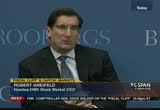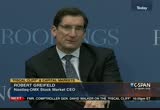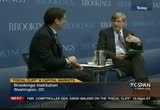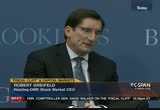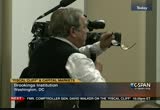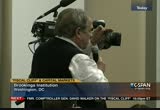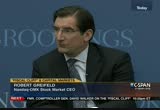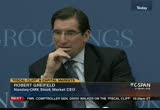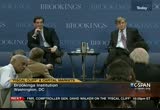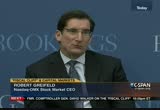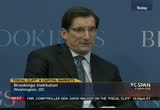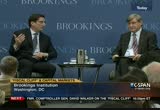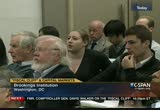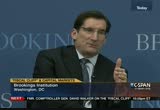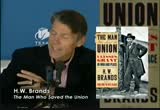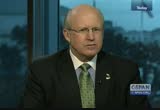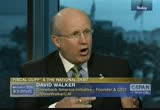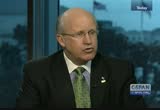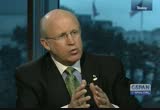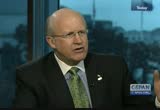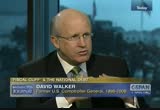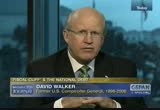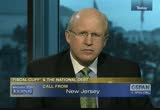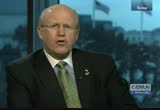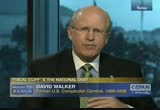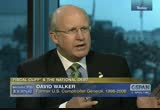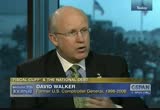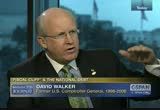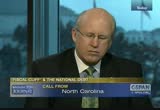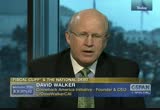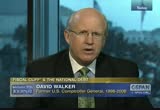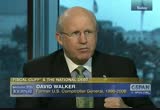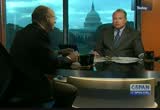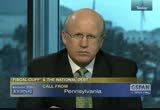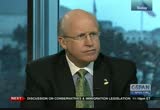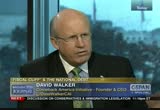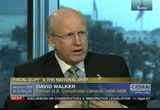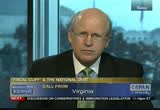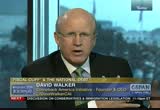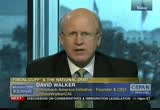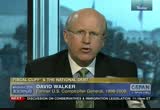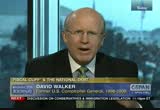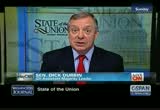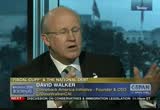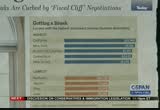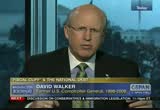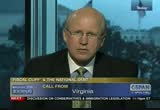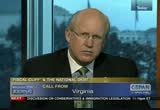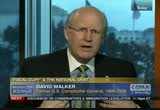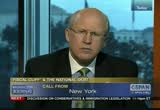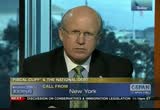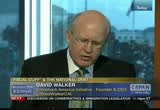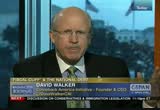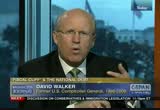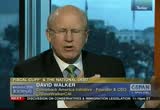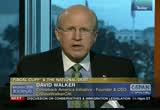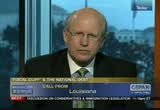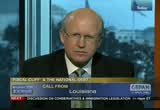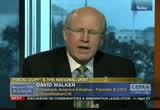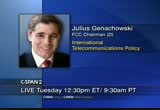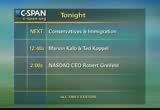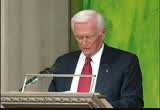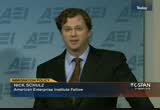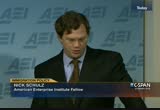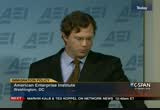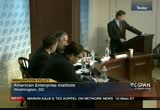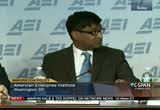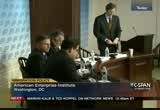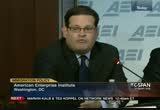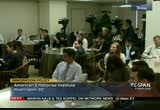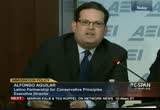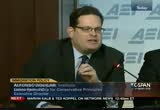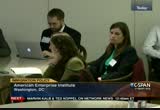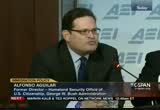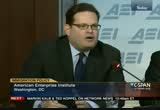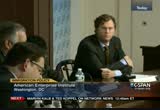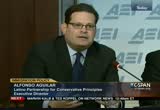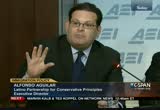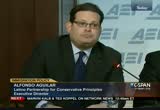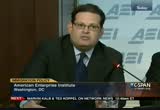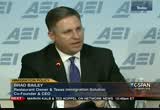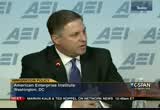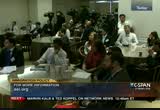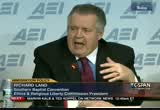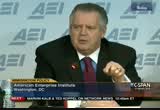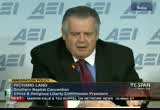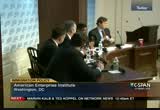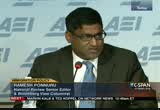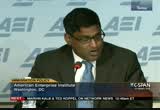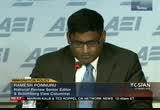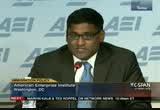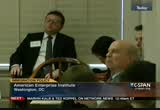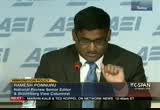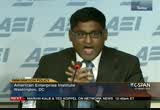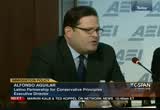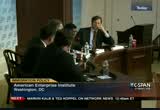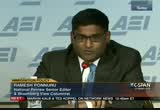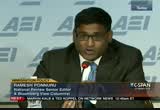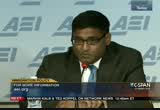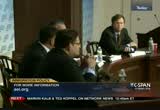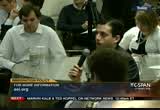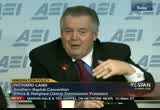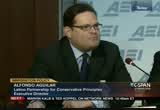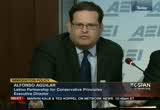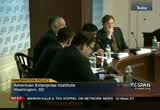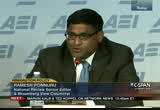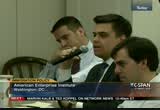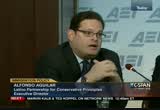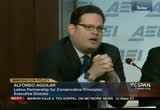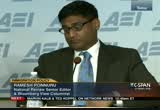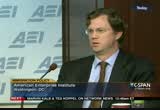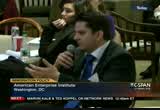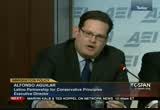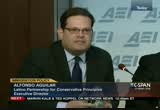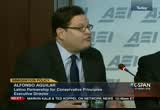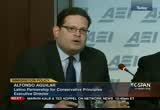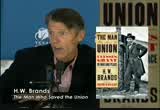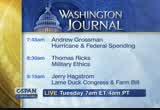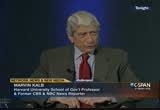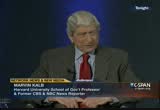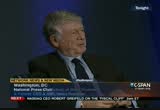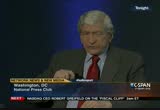tv Politics Public Policy Today CSPAN November 19, 2012 8:00pm-1:00am EST
8:00 pm
grossman and hurricane spending for hurricane relief. then it jerry hagstrom a lame- duck congress and the farm bill. "washington journal," live tuesday >> we are live for a discussion on the future of network news and how it is being shaped for the digital age with former nbc reporter, ted koppel. as you can see, they are seated. this event is hosted -- we expect this event to begin shortly. >> from the national press club in washington, d.c., this is the kalb report with martin
8:01 pm
kalb. [applause] >> hello and welcome to the national press club. i am marvin kalb. the conversation with ted koppel about democracy and the press. if i use the word twilight to suggest that network news, as we have known it, is on its way out and as something new is emerging. whether what is new will satisfy the urgent needs of our democracy cannot be noted at this time. let's hope that it will. without a free and occasionally rambunctious media, we will not be living in an open society. the free press and an open society are intimately linked, one dependent on the other. network news -- if network news is in its twilight, then perhaps our democracy is facing a
8:02 pm
turning point as well. i asked an old colleague and a friend, ted koppel, to discuss the changes in network news and what those changes might mean for our society. ted is known best for his 25 years of anchor and host of nightline, but he has also been a foreign correspondent, a war correspondent, and author, and he has covered many political campaigns. i shared something in preparing with this -- for this program. i ran into the following interesting thought. ted joined abc news in 1963. i joined cbs in 1957. if my arithmetic is right, together we represent more than 100 years of journalistic experience. i mean, that is enough to depress anybody. [laughter] name havewhat in god's
8:03 pm
we learned about our sacred craft of journalism? >> i think we have learned not to make predictions. >> what are your predictions? [laughter] >> i predict that your title, provocative as it may be, may be premature. i think that when americans are finally realize how bad things are, and what terrible straits our political system is in, i think there may be a resurgence of the kind you and i grew up with. >> it is a marvelous, optimistic thought. >> actually, no, it is a terrible thought because it suggests that the ship will almost have to sink before people jump into the lifeboats again. >> do you think that we can, truly, even define journalism? if somebody walks in the room
8:04 pm
and came from mars, and said what are these just talking about? if journalism, explain it to that guy. >> i guess the simplest way is to take it back to where and you and i were young and began in this business. i will limit it to broadcast journalism. when you and i were young, there were three networks. if you wanted to be seen and heard on national television, you had to do it on abc, nbc, or cbs. when i was in vietnam in the late 1960's, mid-60's, late- 60's, if i did a piece in the field, it would be three days sometimes before that he's got on the air. it meant that you -- before that piece got on the air. it meant that you prepared your stories knowing and you had to survive two days, three days,
8:05 pm
sometimes even more than that. i have nothing but respect, admiration, and a little bit of sympathy for our colleagues today who quite literally have to report almost all around the clock. >> lives. >> lives. whether there are working for television, radio, newspaper, there are going to have to file a blog, if there are going to have to tweet, do a little facebook number, the only thing i never see for which adequate time has been left is reporting. i sometimes wonder how they find the time to actually gather the material, but it is all there. we have a more immediate available to us today. more means of communicating information than have ever
8:06 pm
existed in the history of the world. we are so enchanted, though, with our ability to be fast, that i think there is sometimes a lost connection with what we are saying and why. >> i want to pursue that, but i want to ask you first -- why did you even get into this business? >> if i got into it for, probably, much the same reason you did. if that is unfair, because what i'm going to say, i do not think there would have been terribly good at anything else. [laughter] when i was born, and spent the first 13 years of my life in england, my father listened to the bbc. during world war ii to. i was just a little kid in those days. at least, my memory may be
8:07 pm
playing tricks on me, but i think i still remember hearing edward moore rose 0 reports and then rebroadcast on the bbc. and i swear, from the earliest childhood on, all i ever wanted to do and be was a journalist. preferably, as close to edward are murrow as i could make it. >> i did a piece for the new york times magazine on soviet youth. i think, in the spring of 1957. murrow read it like it called me and said, can you come talk to me about soviet youth? he was extremely curious. and, of course, i went down to talk to him and the secretary said as i went in, you have 30 minutes. that is it. max. >> that is okay with me. three hours later, she came in,
8:08 pm
and said, a think you have other evidence today. he used to get so absorbed in these things, that i have listened to him earlier and then met him. i was completely -- this was a great journalist. he was really interested in the things i was interested in. >> if you look back at to the man, i do not think he hired many women. >> there were a couple of women who were part of the world ii. but they did not last. after the war, it went off for different reasons. >> the people that he hired, where people of substance. historians. writers. people who cared about history. sometimes, when i look at what
8:09 pm
passes for news on cable television, especially, these days, i wonder where they find these people. >> he cared a great deal about right thing and one of the points you were making earlier about some things that you wanted to last for three or four or five days before there would get on the air, it had to be written and not written well. murrow cared a great deal about style and the way you presented information. >> i will interrupt you for a second. take a look at how awesome, when you are watching something beaned covered on table -- on cable television these days, it requires a great skill. i am not denigrating it in any fashion. but notice how often would you are hearing is just one ever comes off the top of their head of the man or woman who is
8:10 pm
reporting. take note of how risky it is for a script to actually be written -- take note of how rare it is for a script to actually be written. if you only have a couple of minutes, there really is still required. the essence of journalism not -- lies not simply -- on in the editing. in determining why one thing is important to a story and another thing is not. and putting it into some kind of context. occasionally, even historical context. you know, folks are pretty good at ad libbing, but that takes more skilled than most people have. >> you have taken us from what was and you have raised a little bit on what is in journalism today. what has changed? tick off the major changes.
8:11 pm
>> since you applied again? >> yes. >> first of all, the biggest change in always argue came about in 1968. in 1968, you have to understand, was an extraordinary year. it was the year of the offensive in vietnam. it was the year that lyndon johnson stepped down and said he would not run for president again. it was the year martin luther king was assassinated. the year bobby kennedy was assassinated. if the year of the riots at the democratic convention in chicago. it is not too surprising that women not pay as much attention as we shed -- it is not surprising that we may not pay as much attention as we should. the television news magazine began, "60 minutes." they have done an extraordinary job over these last 44 years.
8:12 pm
amazing work. but it also gives something that no television news program had never done before. it's made money. it turned a profit. [laughter] >> to be clear about that, up to that point -- >> if it happened, it was a rare thing. >> we were, for the most part, a loss leader. television news did not make money. >> it was bill who came to you folks who were producers and journalists at cbs and said -- remember? >> he used to call us the tools in his crown. >> he said do not worry about making money. >> that is right. you guys do not worry about that. what that meant is that when we went out to do a story, we were totally and absorbed in the story.
8:13 pm
we were not worried about how much money it would take to cover the story. ridges did it. -- we just did it. even as late as 1980, i remember being able to charter a plane from rome to istanbul, because you thought you might be able to get an interview with somebody important for your piece. but now, -- >> now, profits. we have become profit centers of the networks. and you know, off with the cable stations also. being a profit center is a huge responsibility because it means that you start thinking in a different way. you start thinking not so much about what the public ought to hear, but rather with the public wants to hear. you are now in competition with the other networks. with the other news outlets.
8:14 pm
not just for an audience, but you are in competition to make money. the way you make money, i will give you a for instance. i may be doing my former colleagues and injustice, but i seem to recall that the last one-hour documentary that played in prime time was on the subject of charlie sheen and his carousing, womanizing, all the other good things he was doing, which were clearly of enormous interest to all of you because that is why they put it on the air. it got a big audience. >> this idea of the difference between need to know and ought to know. >> when what you worry about is making money, you try to focus on those things that are a. most likely to attract an audience
8:15 pm
and b. least likely to cost a great deal of money. i remember eight years ago getting a call from my old friend and colleague, peter jennings. he said, ted, have the bean counters been in touch with you? i said, as a matter of fact, i just got off the phone with them. if what the bean counters want to do know from him and me, was, ted, how many times in a year does nightline use the muscle bureau? they had asked peter jennings the same question. how many times does world news tonight use the bureau? and then ask the same thing of the producer of and good morning america and than they did a simple calculus. so, the bureau coslet say $2 million a year and among all the programs, it was used let's say 50 times a year.
8:16 pm
$40,000 a report. wow. closedown the moscow bureau. what happened has happened, for the most part, at nbc, at cbs, at abc. most of the overseas bureaus now are essentially just mail drops where you may have some local employee keeping the office open and when something really big happens in kabul, in mexico city, in beijing, in hong kong, what you do is you should then one of the star correspondents or even an anchor. but the difference between covering the news, year after year after year in a country, maybe even learning the language, certainly getting to know the people, getting to know who the movers and shakers are
8:17 pm
and what the political dynamic in that country is is not happening in that country anymore. that is also happening in the intelligence-gathering field at the cia where, quite literally -- >> i do not want to go too far. i want to talk to a little bit about the role of cable television, for which you touched on before. in a recent interview with bill o'reilly of a fox, you said making it difficult if not impossible for congress to reach across the aisle and find compromise. you also wrote, not good for the republic. what you mean. >> this goes back. it is a continuation of the same
8:18 pm
thing. in addition to demonstrating that network news divisions can make money, there was a technological explosion. it wasn't just the three networks anymore. you have cable, satellite television, and the internet. now there are hundreds, even thousands of competitors out there. what is incredibly cheap to put on the air is a couple of people like you and me just yelling at each other. at talking. what draws an audience is when, in fact, we disagree. when, in fact, we get nasty with one another. what rupert murdoch's demonstrated is that there really was a hunger in america for something that was less liberal than what the networks for putting on the air. so, fox news was born. fox news has been hugely successful.
8:19 pm
it earns somewhere between $1.10 $0.50 billion a year. -- $1 and $1.5 billion a year. the folks at nbc took a look at what fox has been doing and figure out if they could make news skewing news to the right, if we could make half of that, let's ask you to the left. and so, you have on cable television news that caters to people who consider themselves progressives, news to people who consider themselves conservatives, you have the afternoon radio talk shows, the evening radio talk shows which cater largely to the conservative. you have the late-night comedy show, john stewart, stephen cole there, that tend to cater
8:20 pm
more to the left. and the end result is the area that has gone more or less of fellow is serious news organizations reporting the important events of the day without any kind of political bias. we have grown up as a nation believing we are entitled to hear news that resonates to the news we already -- to the views we already hold. we have seen it this year. a lot of distinguished senators and congress people leaving. snow left the senate because she simply cannot handle the nastiness anymore. there is an awful lot of that and you cannot in a democracy. >> he made the point -- >> the me finish this point.
8:21 pm
you cannot in a democracy expect people to be able to reach across the aisles and make accommodations for important issues if they are terrified that in so doing, it will expose themselves to the wrath of the right or the left. either john stewart's humor or rosh -- or rush limbaugh's sharp tongue. >> what you said not to double long ago was that the commercial success of a fox and ms nbc has become a source of nonpartisan -- for you. meaning what? >> i mean, you and i have known for many, many years that we operated in a business. but as you're saying a few minutes ago, that businesses to make all of its money with "i
8:22 pm
love lucy" and whatever else was hogback in the 1960's an 1970's. they made so much money that they could afford to spend $50 million a year covering the world. that is no longer the case. and that is dangerous. >> my sense every now and then is that of though there are good journalists in cable television, the whole package of cable television when it is presented to the american people tends to debased about anything it touches. that does not mean that every conversation is bad. but it does mean that the package, to me, comes through as a negative.
8:23 pm
as something that makes fun of people. that is overly critical. that is not real. >> a program on sunday mornings , first rate television journalism. for me, he is a smart man who invites smart people on to his program and they talk about important issues in a smart way. i doubt that he has 200,000 people watching that show. it is probably a big audience if he gets that many. it is on a sunday morning which is when programs like that still survive. but you're never going to see that program in prime time. >> in your judgment, since cable television is the place for your going to get right, left,
8:24 pm
political conversation, and a cnn living in the middle so awkwardly and a trying desperately to keep its base, is it doing good things for our democracy in your view? >> no, of course not. is hu doing good things? >> the idea of cable television. >> no. >> i feel, quite often, if you eliminated msnbc, fox, and cnn, it would probably improve american democracy overnight. [laughter] things would miraculously get better. people would talk to one another again rather than engage in an artificial fight which is what most cable television is. >> you take someone like rachel mat out for example. >> very bright. >> rachel maddow is a very smart
8:25 pm
woman and could easily in the old days, and today, i would love to see her as an anchor on one of the evening programs on network television. but the price of that would be that she would have to keep her opinions to herself. it is her opinions that trot the viewership on msnbc. now, she is a very bright woman, as i said. but i do not want to know what she thinks about these issues. i really do not. i want to hear her in ford reporting. i want to hear her interview people with that sharp mind of hers. i do not want to know where she comes down on a particular issue. but that is seen as hopelessly old-fashioned. >> i was about to say. ted. >> those days are over. >> i just want to take a minute to remind our radio and television audiences that this
8:26 pm
is the kalb report. i am martin talbot. our guest today is ted koppel. you have described the good old days of journalism as an imperfect, untidy little eaton of journalism. you then went on to say that these days, broadcast news has been outflanked and overtaken by scores of other media options. help us understand the perceived need for these changes because they not only affect the quality of network news, by the way, do you agree with me that it is in the twilight zone a? >> it is in a twilight. but remember, twilight is usually followed by night and then don follows night. i am still hopeful. [laughter] you know, it is not going to
8:27 pm
stay this way forever. i think, you know, what tends to happen in this country as you and i have observed over the last 50 or 60 years, we tend to go too far to the right, and then we correct course and passed through the middle and go too far to the left, and then we correct course again i think what is happening to broadcast journalism requires a course correction. as we come to realize that our educational system is not as good as we like to believe, that our health care system is not as good as we like to believe, that we are spending -- i mean, there are so many things that are on the brink of taking us into real disaster. not the least of them being the
8:28 pm
possibility of cyber warfare. that is something that television news ought to be covering big time. i am tremendously concerned by the fact that the american public and its military and have never been as far apart as they are right now. we know nothing. we do a terrific job of calling everyone in uniform a hero. we do a terrific job of welcoming them at airports and sang thank you for your service. we know nothing about what is going on in the military. and what is more, the military and military operations are being launched on the basis of drone of attacks, cia operatives, special operations forces out in the field, and all of that back by a civilian employees, civilian contractors, and we know next to nothing about what is being done by any of these groups.
8:29 pm
>> because the reporting is not been done? >> welle, it is because we have found the american public will not stand for a draft and the professional military was not enough to fight all over the world. we have been focused on iraq and afghanistan. we actually believe that all the troops are coming back from afghanistan. i will tell you here and now that is not going to happen. we will still have u.s. troops in afghanistan one year from now two years from now, five years from now. where is the press? obviously, these are not issues that the people who run on these programs today -- >> why not? >> because they do not draw an audience. what draws an audience is charlie sheen. what draws an audience is people yelling at each other. it is not enough to say these
8:30 pm
issues are important. if we actually -- i know it sounds totally idealistic, but when you and i became journalists as young men, we actually believed that we were entering, really, a special, chosen profession that meant something to a democracy. quacks' of calling. >> exactly. -- >> of calling. >> exactly. honor, i never thought i was going to get rich as a journalist. you do not go into journalism to become wealthy. >> the changes we are talking about, you have already touched upon the faaffect it has on our
8:31 pm
society, on the business itself. value systems change. i am not saying we can ever return to the good old days. that is done, but what worries me is whether we can take the value systems of old and try to see them preserved in the digital environment of today. do you think that is possible? >> i not only thing that is possible. you and i need a third person here telling us what is being accomplished in the digital arena. i think there are people -- we are both having a senior moment.
8:32 pm
people who look at all the blog sites. >> i did not. >> there are curators today who because there are so many thousands of web sites make it a point of saying, if you really want to know what is interesting in the area of foreign policy or the environment or cyber warfare, we can leave you in the right direction, and the technology is there so you and i can gather material in a fashion that is
8:33 pm
infinitely superior to what we used to use. we can harvest information. >> with the reporting, you are getting a ton of information. these curators can provide information, but how reliable is the information? is it based on reporting? >> two key facts have to be made. there is a brilliant material out there that is being well- reported. >> how do you know that? >> i have been told. on the other hand, the implication of your question is correct. we do not know. when something comes across on the internet we have no way of knowing what the intention, what
8:34 pm
the goal is, what the bias is of the people who are putting it out there. i will tell you something i learned from one of these talks. it was on the subject of google. the speaker was making the point that he was a progressive, and he said a friend of his who was very conservative, they took their laptops, and they simply type into the search engine the word egypt, and they got a totally different responses. why? because there is a process going on. every time we search for something on our laptop, we are not only gathering information.
8:35 pm
we are giving information about what we buy, about what we like, about what our political bias sees maybe -- biases may be, and you and i ought to get the same information if we tie in the same word. that is kind of scary. >> somebody is making up their mind about what we want. >> it is not somebody. it is a series of 0s and 1s. it is a computer algorithm. >> the algorithm is fine, and i understand it exists, and i will salute it. is there, but i want to know
8:36 pm
what that has to do with journalism. who gets up in the morning and covers some say -- something? who is going to cover a war? who is going to cover a campaign? without the journalists doing on is information gathering, all this stuff is below it. >> there are plenty of people who are going to do gathering, but the key word -- >> that is not true. there are fewer reporters covering the war in afghanistan then there has ever been. >> fewer american reporters. >> american and others as well. >> i frequently will watch the bbc or of jazeera, because
8:37 pm
particularly when things are going on in the middle east i am going to learn more from people in the area. >> do we know they are reporters? we know they speak arabic. >> we know they are reporters. do we know they are objective is? that is a different question. thus we do not. >> we have almost given up in our own country. it is still possible to pick of the new york times, to listen to npr, to watch the news hour. the all books are there. our old friend says, -- the outlook is there. my old friend says, is dull. sometimes i say, you are a little too daring. but is there.
8:38 pm
there is still good journalism being committed. the good journalists cannot help it if the public seems to be moving in other directions. i am making the point, and i do not know if i am wishing for this to happen, but i think it will only happen when people realize how devastating the consequences are of not having objective journalism. >> do you know clark kent? >> know him well. we have on occasion use the same phone booth. >> clark kent is no longer the reporter for the daily planet. >> what does he do now? >> he is of lager. >> where does he change -- he is a blogger. >> where does he change?
8:39 pm
>> probably in the curator's kitchen. that is an indication of how profoundly different journalism is from years ago to today. i am saying this is so much more difficult to find, and the areas you will go after are not terribly reliable, and i would like to think about the north star of journalism today. when you started, you had somebody who did extraordinary things at the network, including starting nightline. for me it was a lot of other people. who are they in today's world? been thect isn' he had
8:40 pm
president of abc sports, and we were terrified of this guy who came in wearing his jungle suit and his bracelets he wore. he was not one of the champions of great journalism when he came on. he became that. he evolved, and he is involved because he ran up against in movable objects like helen k. smith and frank reynolds, and people who still believe good journalism was important, and nobody -- >> he recognized good journalism and moved toward it. >> he recognized it. i will tell you the back story
8:41 pm
of my life. for about a year before the iran hostage crisis common they came to us and said, anytime something of major importance happens, run a story on it, 10 minutes, 15 minutes. he initially wanted a one-hour news cast at the dinner hour. the affiliated stations would not go along, so he decided he was going to seize that time, and by the time we got to the iran hostage crisis, we were running out of things to say. he said to us, i do not care. tell me the difference between a sunni and a shiite. tell me about assad and how he came to power.
8:42 pm
he kept that program going, because he recognized there was a tremendous american appetite for this story. had it not been for that appetite common and it wouldn't not have been born. >> you did not have the tonight show or the letterman show. >> i will tell you something that has changed enormously. when nightline began in march of 1980, you did not have the letterman show yet on cbs. they would be run some old and trauma, but among the three programs, but tonight show, the cop drama, and nightline we had 70% of homes watching television at 11:00 at night.
8:43 pm
these days they are lucky to have 25%. that is what happened because what you did not have 35 years ago was cable, satellite the internet, and all of those things have diluted the importance and the reach of the network. >> maybe twilight is too soft. >> you still have evening newscasts. among the three of them, i suspect we have between 15 million and 20 million viewers. it was 50 million. cronkite alone probably have about 20 million people.
8:44 pm
>> that certainly is true. the responsibilities of journalism to democracy and to our society. i want you to talk about about a little bit more. i want you to explain why there is this connection between the flow of news and a vibrant society. >> if the american voting public is ignorant of the issue, is uninformed, how can it make intelligent decisions? it is bad enough the citizens united decision of the supreme
8:45 pm
court has resulted in -- the new york times said the amount of money spent on all the election campaigns, $6 billion. i was shocked by that. i moderated a discussion. it was fascinating, but mr. rove made the. we spend infinitely more than that on dog food. >> is a absurd -- it is absurd. >> is. as much as i love offense, -- op eds, if they end up being produced, people keep saying things were much worse in jefferson's farm.
8:46 pm
yes, they were, but you only had broadsheets being distributed. you did not have everyone walking around with a communications device. information is spread so quickly that if we do not have reliable, trustworthy, objective sources of information, our whole electoral structure is going to collapse under its weight. >> ciena in's story about how the new york stock exchange was under 3 feet of water, it was not true. it was not true at all. howee in in's story about the nyse-listed under 3 feet of water -- cnnn's story about how
8:47 pm
the new york stock exchange was under 3 feet of water, it was not true. they got alive. -- a lie. i do not want to pick on cnn, but that is one of the dangers of trying to retain the best standards, some practice, some place where you can turn and say this is the right way of doing things, and this is simply wrong. despite all the good things you have said, all of that stuff being said, i am left with an uneasy feeling. i do not know where the information is coming from.
8:48 pm
remember years ago when we knew every cameraman who is taking pictures of some of zandt in cairo. -- some event in cairo. you knew it was and of effective look. -- an objective look. i do not know who is taking the pictures. they may be working for some small network because the network does not want to bring in its own cameraman. >> notice if you watch more than one newscast, notice the number of times you will see precisely the same video when it comes from overseas in large part because the networks do not have their own reporters, and they have brought it from the
8:49 pm
same source. . no. 2, what is wrong with having a local reporter covering the event? a local reporter speaks the language and knows the people. let's say the local reporter is reported from tehran and the local reporter knows if he or she makes a misstep, they are going to be arrested and thrown in jail. the american reporter may get thrown out of the country, but that is probably the worst that is going to happen. i find there is no willingness to believe objectivity in journalism is possible. i keep hearing there is no such thing as absolute objectivity, , when you go toommo
8:50 pm
hire a lawyer, and you ask, do you like me? if you do not like me, you are not going to be able to put your heart into this thing. when you go to a doctor, you are not asking what his or her politics are. you want that doctor to deal with you on her best professional expertise, and what do our critics want to believe? i argue there really was a time when men and women could be a professional journalist capable of objectivity. that does not mean they do not go home and rail against the darkness. that does not mean they do not have the favorites in an election.
8:51 pm
to this day, you have known my wife for many years. she does not know how i vote in an election. i do not tell her. i do not think it is appropriate. >> and you are still married? >> let me put it this way. she knows everything else about me. i think she can figure it out. i never told her. >> that is so interesting. what does that say? >> i have believed since i was a young and reporter that my personal opinions have no place. >> when i talk to someone who was my student, bill believes profoundly you are of bias died.
8:52 pm
-- a biased guy. i would say, you have not a clue as to how i vote. he said, everybody votes. that attitude has been effective as a kind of truth by so many people. >> absolutely. until we are prepared to except the principle of objectivity or at least a general effort toward objectivity is possible, patrick mcgann -- monahan said everyone is entitled to their own opinion. these days we believe everyone
8:53 pm
is entitled to his own facts. you want right wing facts, we have got it. you want left wing facts, we have got it. >> how have you made it clear for people there was a basic impulse on behalf of the reporters to tell it straight , but cable is where you are getting the opinion. cable is where you are getting the opinion on the networks. they say, you are as biased as everyone else. did you will not admit it. >> i think the problem is they
8:54 pm
are not putting the money into the kind of news coverage that is vital to a democracy. the money would help. when has the world ever been a more dangerous place than it is now? i happen to believe at the worst times of the cold war, the fact of the matter is there was a balance between the great powers. these days we need information from the third world more than before. we do not have the reporters. >> that is true. i am sorry to say at this time we have to run out of time. they have got to pay respects for people like us.
8:55 pm
i want to thank our audience who has been so polite tonight. they have been able to see us through the magic of the internet. they can actually see us, not just on cable, but they can see us through the internet all over the world. it is a magnificent thing, and i want to thank our guest. [applause] let me close with the following thought. we are all dazzled by the digital age and understandably so. given the speed and access of everything live is truly amazing, but every now and then i worry we may be losing sight of the fact that this new technology is only a tool.
8:56 pm
it is a tool for the dissemination of what we have discovered. it can never be considered more important than the content of what we have discovered. hourly daily broadcasts, the story that need selling, a crime or of this judgment that needs exploring. i asked our their indian and new edward r. murrow -- are there any new edward r. murrows? we need that. journalism is essential to democracy. he once said, this is no time for fear, and he was right. rise up. ted and i have done the best weekend. now it is your turn.
8:57 pm
use these modern tools, but use them well. now once again, good night, and good luck. [applause] you have been warned. this is your time to ask questions. there are two microphones. i see one over there. if you get up to ask questions, that is fine, and the idea is to ask a question. do not make a speech, because i will cut you off. i will be very nasty. why don't we start off on the right?
8:58 pm
>> how are you doing? can you assess the coverage of the israeli-palestinian conflict? is it clear who is doing the best job in hamas and the wars do not get coverage. and now -- is it clear of who is doing the best job? >> there has been a war going on in gaza for well over 10 years now. it has cost more than $5 million. 5 billion people alive died of starvation, disease, have been driven into the jungle, more than 5 million people. we have barely even noticed it.
8:59 pm
i mention that because journalism is frequently affected by national interest. to the degree the perception of what happened in the condo is less important than what happened in the name -- in the condo is less important than what happens in the united states, we do not cover it. we are engaged by what happens in seriocomic often -- happens in syria, but i do not know if shed a great deal of light. i know you began by asking what and what ig in dawsogaza think about that. >> yes.
9:00 pm
>> any time israel is involved in a story, did becomes excruciatingly -- id becomes excruciatingly difficult to cover, because there is a sense of identity in this country with israelis, and many reporters, old friends and colleagues of mine used to be criticized for taking an anti-is really point of view -- anti-is really point of view. he spent many years living in the arab world and had a sympathetic. of view to arabs. i think what is happening in gaza right now meets in the definition of tragedy.
9:01 pm
the israelis cannot be expected to stand by while their cities are rocketed. on the other hand, the idea that the israeli defense forces are equally professional, the number of casualties on the palestinian side are going to be much greater. they are leaving an impression there is something unfair. this is the time you need correspondents who have spent years in the region, because by and large, you ask what i think of the coverage. i think it is surface. it focuses on the casualties.
9:02 pm
you do not know what the possibilities may be for agreement on the sides. i think that is one thing we have lost in not having correspondence to report from the region year after year. >> it is interesting that a couple nights ago, and abc world news tonight had a tour during another story while the gossip story he erupted -- the gaza story erupted, and she had a big intro. they gave her about 45 seconds to do the story, and you could see she could not get it out. it was difficult, so that is yet another dimension of trying to make everything right size,
9:03 pm
even and alan -- an analysis from a reporter who really does understand that story. it would have been wonderful to hear more from her. >> yes, please. >> you mentioned an interesting point before he cut you off about our intelligence services. >> he does that all the time. >> it was the moment you were talking about how our intelligence services are may be stretched too thin. you were intimating we were not only having a lack of of we were stretched.
9:04 pm
i thought it was interesting because the americans trust the pander gaucherie -- pedagoguery. >> essentially the same thing is happening within the intelligence community, and that is the perception that technology is an adequate replacement for human intelligence. there is a perception you can get anyone from anywhere. you can reach any part of the world in 18 hours or less, and by virtue of the satellite, you can report instantaneously, but that is a substitute for having our reporter on the ground for years.
9:05 pm
the same thing has happened for ages. the intelligence community has suffered budget cuts, and people say you can get the same kind of information with intelligence and reconnaissance when having a unit on the ground gives you a third dimension you cannot get by technology. >> yes please? >> i am a retired former service officer. i ended my career shortly after afghanistan at the state department with a press officer who has never worked with the press. i am wondering if those of you
9:06 pm
in the networks ever noticed it went away, and the youth -- do you think that is part of the weakening of the ability to report stories with great object committee oversees? >> we became friends after i came back three years in indochina and was assigned as a correspondent. i have been blessed throughout areer with havingrie competitors. as you may imagine, you do not travel with people from your own network. did you travel with the opposition. i was impressed with these men's performance. during the time we travel
9:07 pm
together, henry kissinger and i in the middle east, we always have somebody on the plane, and i remember a woman who was a reporter, and she did not talk much. she was a very good reporter. i rather suspect you do not have anyone traveling with the secretary anymore, and that is a plus. >> i want to share something. being a competitor, when we
9:08 pm
travel in the middle east, i had a bad condition, and we would arrive with our overnight .ridabag abc news picked up very often my typewriter, my overnight bag because he could see i could not take it up. that is a competitor. >> i was hoping you could talk about the activity. i use the example of global warming. how would you cover that story in that time when most of the community appears to be pretty solid on one side.
9:09 pm
who do decide is the most credible people in that discussion? >> i was for almost 26 years the a anchor of the managing editor of nightline, and i was deaf to reporters who would give one opinion for, one of opinion against. it is the laziest form of journalism in the world to the degree one side or another can be ascertained as having the facts on its side, you have an obligation to report back. i do not think there is an obligation to say, on the one believe andian ss apple will fall from the tree and hit the ground and there is
9:10 pm
a law simply because an idiot and claims the other was. objectivity it does not mean taking one of this side and one of that side. your job as a journalist is to do the reporting, and to analyze it, to put it into proper context, and if the overwhelming scientific community, or the scientific community overwhelmingly says there is global warming, the use -- do you go in the direction of some other intelligent voice? why not? you do not do it now with equal time. >> when that was first directed
9:11 pm
at the networks to be objective and fair, what they would do, as you remember, they would put a republican up here for 30 seconds and a democrat for 30 seconds, and they felt they were telling the story, but they never got at the essence of objectivity as you have so well described its tonight. >> my name is catherine rodriguez, and i am a junior journalism major at gw. my question is in this volatile climate, we have noted several instances where major news networks rushed for information that happen to be wrong. how do we balance accuracy with the desire to be the first to break the news? >> that is a good question.
9:12 pm
>> i have been lecturing about this desperate approach, which i think is often the driving engine, particularly of 24-7 cable news. somehow when a major story broke, i still remember moments of huge self congratulations. if we could say, we have the story one minute 38 seconds before, and i remember saying at the time, i do not know of anybody out there who is sitting there as we were sitting there
9:13 pm
with 10 television monitors aware of the fact cbs had something first, and we were third. if you are watching television, are you switching madly between the channel 7? what was bad 25 years ago is horrendous today. what if i am watching cnn, and i am not constantly slipping back -- flipping back? i have a teenage grandsons who seem kate -- incapable of watching something for more than eight seconds at a time without switching to another channel. did i answer your question?
9:14 pm
>> not really. there is one more year. this will be the last one, because we are out of time. i want to apologize to everyone waiting to ask a question. when this is over, why don't you deceived mr. koppel -- besiege mr. koppel? >> i have an on-line news site that is usually considered to be dull and boring, and we have these not just to disseminate but to get the information out, and throughout the evening it seems we have been given this choice of charlie sheen report
9:15 pm
and important news presented in a way that is the goal, and we have so many tools at our disposal, why do we need to think of important news us something that cannot be cool and engaging and fun and even profitable? why does it have to be presented as something doull? >> you may be surprised to learn i do not entirely disagree with you. for many years i used to tell the staff there is no story out there we cannot do it in an engaging, interesting way. i think you have made a mistake of interpreting what we have been saying when we refer to important that important means
9:16 pm
dull. on the contrary, i think those are the things that are most important, and it is our obligation not merely to say, here are the facts, do with them , and we have ton make the movie it interesting. if interesting means controversial, it's interesting means argumentative, it's interesting means sacrificing objectivity, i guess -- if interesting means sacrificing objectivity, i guess you are right. >> i do not think you will ever be seen as dull.
9:17 pm
thank you. [applause] >> thank you. you are as wonderful as ever. >> thank you for joining us this evening. we wish you a safe and peaceful holiday season, and we will see you early in 2013. good night. [captioning performed by national captioning institute] [captions copyright national cable satellite corp. 2012] >> coming up next, the ceo of nasdaq talks about his campaign to avoid the fiscal clift in which automatic tax cuts would
9:18 pm
take place unless congress acts. and david walker offers his idea for avoiding the fiscal cliff. later, discussions of the future of immigration legislation. on tomorrow morning's washington journal, federal spending for hurricane sandy relief. after that, jerry had angstrom-- hagstrom on the future of the farm bill. plus your e-mails, phone calls, and wheatweets. the woodrow wilson center hosted a discussion tuesday on the challenges in the middle east for u.s. foreign policy.
9:19 pm
you can see it live starting at noon eastern here on c-span. president obama met with congressional leaders last week to discuss a plan for avoiding the fiscal clef. the ceo of the nasdaq stock market talks about the campaign, where he and other ceo's are willing to pay higher taxes as part of a deal to avert a fiscal close. he spoke for about an hour. >> good afternoon. i am vice chairman of brookings. i would like to welcome everyone today. good to see you. it is my great pleasure to welcome my colleague and friend
9:20 pm
to brookings. there is no doubt bob is an extraordinarily successful business executives. the value has increased by a factor of four. revenue has gone up to 1.7 billion. cash flow has gone up her year, and he has taken over the niche market and made it one of the most important in the world. those are the facts. those are straightforward, and he has a track record to be proud of. the market he has until -- phil is the reason we are excited to be here today.
9:21 pm
9:22 pm
which we keep our growing economy it competitive in the world. that is one reason we invited bob to come. people want to know what market participants think about that. today we have the market ceo. it is my pleasure to welcome him to brookings. >> thank you for that kind introduction. i have to start by saying i first met glenn seven or eight years ago. at that time i was a capable and focused business executives but did not have a lot of time to spend on the use of the wider world. now that has changed, and we have had interesting discussions over the years, so as i talk about certain policies, if you
9:23 pm
happen to disagree, plame glenn. it is my pleasure to be here. i appreciate the opportunity to speak today, and i would like to thank martin for setting this up. we need to take a hard look at the significance of the fiscal iff facing the united states of america. what is the political mobilization necessary to relieve -- to prevent damage to our economy? we have an important role to play in solving financial challenges facing the u.s. as lynn said, i am the president and ceo of the group. -- as glenn said, i am the
9:24 pm
president of the group. when you think about me standing here today, it is interesting small for the operators of markets talking about that. -- talking about debt. we do not trade it. we do not regulate it. i want to talk about the deficit, because in many ways, it is a spreading cancer. i call it that, because we know it is there, and we know it will spread, and we know what it can do. we are not operating as a prudent patient. to many americans choose to ignore it.
9:25 pm
we are in a state of denial, because it is not causing a crisis. to many americans have a false sense of security that everything is ok. neither of these beliefs are true. the government seems able to add one trillion dollars a year to the national debt. many people believe we can do this in definitely. too many people think we can do this decade after decade. as a country, we can borrow money. my notes say 1.7%. now they say 1.6%. that is a happy state of affairs. we do not deserve to borrow that
9:26 pm
money cheaply, because we have not presented a vision or courage to decide how we will pay it back. we must decide. we must decide because the process of delaying the day of reckoning with our $16 trillion debt is hurting our economy today. we don't see it but it is hurting our economy, our businesses, and is hurting the the fiscal cliff scenario with a reduced federal spending is now just two months away. unless congress and the white happen as "the wall street journal"reported a fried egg, no doubt, most companies would suffer if the u.s. goes over this cliff and economists say this will slow economic growth and will drive us into recession. my good friend terry duffy at the cme said we have seen corporations poured cash, individual doing the same. -- ohorading cash and
9:27 pm
individuals doing the same. this is not the average business and people need to realize that. those of us outside of government must continue to make it clear to intend that compromise can no longer be considered a four-letter word. in discussions and debates that prevented the decisions from happening last year, we must move past that. it has certainly been a plus to hear the president and house speaker say repeatedly over the last two weeks that compromise is now with both parties want. words are a start but words are easy and we must have a result
9:28 pm
for action. -- a resolve action. i don't expect to have a grand bargain achieve by the end of the year. the extension of the bush tax cuts and a deal not to enforce across the board federal spending cuts on january 1 could be the most we could reasonably hope for. that will leave the markets in some degree of uncertainty. the uncertainty relates to whether or not the grand bargain will be released in the first half of next year. that uncertainty really is a cause for concern for all us in the business community. when we think about our u.s. indebtedness and the ratio of increase in the federal debt, is important to recognize that our ratio of gross debt to gdp is now more than 100%. among the g-20 economies, we now rank third of indebtedness behind japan and italy. five years ago, we were at 62% and ranked ninth.
9:29 pm
at the current rate of u.s. federal debt rising by $1 trillion per year, the ratio of debt to gdp will be 114% by the next presidential election in 2016. as many scholars have noted, increasingly of late, the downfall of great nations across the centuries always began with their inability to respond when the foundations of their financial houses cracked. the truth is, debt is not an alternative means of funding. debt, in our context, has become a convenient narcotics, as easy and addictive as any drug lulling us into complacency by postponing the hard choices, raising revenues or reducing spending. increasing levels of debt also increases the amount of interest to be paid, further increasing
9:30 pm
the amount of resources that ultimately we need to be devoted to repaying the debt. i run a company at the center of global markets that interacts with 3200 listed companies around the world and many market participants. i speak every day to chief we all agree that a government that incurs substantial recurring bar wing as a means of funding eventually will act like a company short on cash flow. by this we mean a company to short on cash flow will always postpone investments. they will cut maintenance, r &d, pensions, and benefits and otherwise short change its future. all the while, it will scramble in turn -- for new sources of revenue and new opportunities outside its operation. when the government behaves this way, it not only shortchanges the future, it profoundly impacts the entire economy and all its citizens. the longer we go for a better balance between federal
9:31 pm
expenditures, the more we will postpone and the night expenditures necessary to support the future. we are creating a terrible burden on our children and grandchildren tomorrow an exasperated -- and exacerbating the paralysis of the markets today. the historical evidence suggests long run implications for our economy could be severe if our $1 trillion per year continues. highly indebted countries dedicating 90% of gdp on average experience a reduction in gdp growth of one percentage point per year relative to less indebted countries. at the individual level, a slower pace of gdp growth means the per capita gdp could be reduced by as much as 30% by 2013.
9:32 pm
this trend pleasant to $18,000 less per year for every man, woman, and child in the u.s. than we would have otherwise earned. that prospect is now less than 20 years away. the major financial crisis brought on by high levels of debt could have a negative impact on the economy than these numbers indicate. in the short term, the primary impact of the debt trajectory viewed as unsustainable is more uncertainty. we live with that today. there is more uncertainty about future taxation and spending policy. there is more uncertainty about
9:33 pm
government's ability to prepare for future needs by reloading the fiscal canna necessary to deal with the geopolitical or economic issues. there is more uncertainty about central bank intervention in the credit markets and when it will end and the subsequent course of interest rates increasing. there's more uncertainty about who will hold the debt, who will get caught holding the bag when the low interest rate party ends? at nasdaq, are listed companies cannot innovate or concentrate on investing in new capital, hiring new workers, grow their businesses when they have to worry about the safety of their cash. they hesitate due to uncertainty about future growth. in the case of the sequestered, they even need a plan for layoffs. there are enough challenges and headwinds for managing business operations day to day. chief executives understand that when they surveyed the destructive market consequences created by the federal debt. they shake their heads and think," these are self-inflicted head wounds. why is this still happening?"
9:34 pm
a survey conducted in september by the senate for quality said that 35% of investors say continuing budget deficits and federal bar wing have more influence on their confidence than any other issue or event. that was in september. i would venture to say it is higher today. when are listed companies do not grow, investors do not buy stocks an entrepreneur cannot raise capital. when these things do not happen, the u.s. economy does not grow and the american people suffer and so does the dynamic nature of our markets. people might ask," what does that mean with respect to the market? why does that matter?" the stock market is the most transparent price discovery mechanism for capital. it sets the price of equity risk and return and they are exchanged between investors.
9:35 pm
i for partners and investors also used stock market prices to make their own decisions about raising capital and investing in new companies. the stock market does not set the risk and return in isolation. it does so in the context of the broader economy or stocks must compete with other assets for investor capital. the government inaction and the central bank intervention in credit markets to keep interest rates low and finance the deficit is creating distortions in the competition for other assets. we all realize at some point that this distortion will end. it is the same kind of deleveraging we have felt for the financial crisis of 2008 but this could be a much grander scale. many types of assets will be re-priced. bond yields will rise and bond prices will fall and the cost of financing current deficits will increase.
9:36 pm
there won't be much cash available to move into government investments for the future. new bridges, research and the basic sciences, public schools, better equipped for the 21st century, and so on. it will mean less spending on a rigid on technology and less capital available to existing companies and less capital for entrepreneurs looking to go public on our market. a decline in american ingenuity but would be a consequence in overtime, there would certainly be decline of our position in the world. as all prices adjust to market forces could reach a point where investors refuse to buy u.s. treasury bonds. we see investors' reaction -- reacting to the potential of these realizations now through an aversion to risk. since 2007, over $1 trillion has flowed into bonds and even a greater amount has flowed out of equities.
9:37 pm
in addition to a lack of clarity about huge tax policy, -- about future tax policy, this act as a deterrent for investments. $1 trillion is moving into fixed income where it is basically paying zero. that shows a fundamental aversion to risk. for companies able to access the credit market, times have been pretty good. investor appetite for this debt translates into cheap money for many companies. many start up companies do not have access to debt financing. the companies that create jobs in this country rely on equity financing. the debt markets have never been available to them and are not available to them today. the vicious cycle we're in
9:38 pm
today is the startup companies have limited access to capital and capital is not there because they are growing an aversion to risk and that was triggered by massive uncertainty by what we are about and what our plans are for addressing -- addressing the fiscal deficits. 1.7% is certainly attractive to many companies who have been able to access debts but the question is -- do we deserve that rate and why is that right here? a debt is cost based on the ability to repay. if our ability as a nation to repay was based solely on our ability to print money, debt would cost more than 1.7%. that is because inflation would be created as a result of the printing of money on the other hand, our ability today to repay should be based on our ability to increase revenue or decrease spending.
9:39 pm
with political dysfunction, we're not sure we have that. we appear unwilling or unable to use that tangible ability. we have to recall' in washington last year around the the debt ceiling debate, the reaction to simpson-bowles and the performance of the super committee. the reality is our ability to pay is based primarily on the belief that we will find a buyer for our future debt and we will in turn use those buyers funds to repay our current debt. and bankers terms, we think we can keep rolling it over. others have said that we risk losing the u.s. role as the world's reserve currency if we do not be a responsible way. that is not a current rest but it is a risk within the decade when you look at the pure math. that ignores the emotional
9:40 pm
aspect of the financial markets. our ability to find a buyer is based on the credit market assessment of future actions of the fed and the dollar's role as a world currency. to the extent that changes, we will be dealing with a new world. when rates eventually go higher either due to the fed finally tightening credit or the erosion of the dollar, then credit will no longer the cheap. at 1.7%, that will be a dim memory. if this occurs at a time dictated by the markets rather
9:41 pm
than by washington and's own choosing, there will be a number of a very significant consequences. investors will begin to refuse to buy current government debt and as possible you could see a threatening crisis in the years to come. the federal government would be hard pressed to reload the fiscal cannon. the cost of the debt service in that environment will be enormous. investors and retirees with social security and state debt will see their portfolios lose value. home buyers will see the cost of mortgages to rise and home owners will likely see the price of their homes fall as few buyers qualify for these
9:42 pm
mortgages. the government could have its back to the wall at that point and we would be forced to embrace more drastic steps to ensure fiscal balance of the government does not take action now. takensn't the government action? let's be candid -- putting aside the rhetoric -- rhetoric and the possible last two weeks, the behavior in washington in recent years confirms we have lost the ability to compromise. politicians who attempt to move to the center are set upon by their own side. one size faces continuing pressures never allowing a cent of spending cuts and there's a call countervailing opinion from the others as a reserve -- the other side that does not want a tax increase. each side of states the other side cannot win no matter what
9:43 pm
the consequences. the vast majority of americans consider this irresponsible and want solutions, policies that seriously confront the national debt we are facing. as i think about this, the situation within the beltway is a variation on the classic prisoner's dilemma game. in that game, each player's optimal action lease to an outcome that is damaging for both. in the case that federal got -- debt and the government, what each party perceives as its optimal action is essentially neutral for them but extremely horrible for the economy and the rest of us. i am one of more than a corporate ceo's who will sign doubt for the campaign to fix the debts. some of you might have seen the news about our goals and our agenda. we think there is a lot to like in the simpson-bowles recommendation. we all recognize a common thread that -- the inability to be sustainable in the federal budget, the inability to have a sustainable federal budget is hurting our business in a fundamental way. we all agree there must be shared sacrifice. these federal budget must be put on a path to sustain the ability that can clearly withstand any changes and the political winds that might occur. this means additional revenues
9:44 pm
will need to be raised including from businesses by broadening the tax base while reducing the tax rate. tom quinlan supports the reduction of the elimination or reduction of certain tax deductions in exchange for a lower corporate tax rate and the repatriation of cash held up by the u.s.. the uncertainty caused by not addressing the fiscal cliff will continue to hurt business. tell us the rules and we can play the game. if the rules are not certain, we cannot start to play the game. with dollars that federal spending will need to be curtailed. i want to be clear -- i am an optimist. i leave the gloom and doom most on to my lawyers and accountants. it has been hard to be completely optimistic about our economic future if the budget problem is not addressed.
9:45 pm
globally, we are seeing recession in much of europe. chinese growth is slowing as is grow the other emerging markets. out better to act on the u.s. budget is aggravating existing weakness in the global economy. this is clear, it is time for real leadership in washington, for elected officials to have the courage and vision to do something right for our country. it happened under president reagan and president clinton when major compromises were achieved on debt and deficits. it can and should happen again. if not, our country's economy will grow slowly -- more slowly than it otherwise would have. at nasdaq, i suspect we will continue to face headwinds in our core business.
9:46 pm
this has negative implications for our trading and listings business. we may do better than our competition but not as well as we should be doing and not as well as our economy should be doing. the confidence of executives who invest, grow their businesses as well as investors in our markets and that is directly related to the problem of the federal debt and deficits. we also recognize the fiscal cliff and the sequester are not a compromise or even a path to sustainable growth.
9:47 pm
these policies were created to prompt the government to act in the future. now is the future and we are waiting to see which side will blink and who will win. this could assure are mutually decided destruction. my our elected officials must recognize the principle governing responsibility is paramount to their legitimacy. governing to win does not, in fact, provide legitimacy. before we begin the q &a, i want to simply state that after this year's long and bitter political season, it is time for air nation to come together. time is running short to decide how we will address our national debt problem before it becomes a crisis. i certainly want to urge all of you to join in. everyone can pitch in now in their own way. we created a website for
9:48 pm
employees in the u.s. to fix the debt and communicated to their representatives in congress about the urgent need for action. business leaders, employees, investors, retirees, we all share a huge stake in this economy. i invite chief executives of other countries who have not committed to fix the dead to join me and the attic -- and the 80 other ceo's ready to be involved to drive this movement which was organized one year ago. as we continue to build rapidly strong national voice demanding compromise, that will make it more appealing and politically possible for our representatives to take the necessary action so thank you. [applause]
9:49 pm
>> thank you, i am marchant bailey and i will start of the questioning and then we will throw it open to the audience. i want to congratulate you for this effort to fix the dead. the debt. many of us felt the pressure from the business community was important to get this done so i think it is terrific. you mentioned some of the
9:50 pm
consequence is likely to happen as a result of continually increasing the amount of debt. equity markets may suffer and eventually is and as rates will rise. -- interest rates will rise. we have been hearing that for a while. equimark it's an interest rates have stayed low. can you give us a sense of why that is or what is the time horizon where we might see some
9:51 pm
of these impacts? that would put pressure on congress to do something. >> i think we have seen that pressure. when you speak to the fact that $1 trillion has moved into the fixed income market, that shows investors are saying they have real aversion to risk. the demand and the debt market has helped with central bank action to contribute to low rates but that does not speak to our unemployment issue.
9:52 pm
when you look at what drives the job growth in this country, it is small businesses, they are growing. those small businesses are growing but right now they are not part of the debt market but they are exported from the market because you don't have a supply into that world. one of the few bipartisan effort to we saw last year was the jobs act. that was in recognition that because of the state of affairs, we were choking the life of the small business growth. that was meant to help it.
9:53 pm
we are definitely seeing a clear impact today. >> there is a lot of merit to simpson-bowles. there is also the rivlin- domenici plan. many people including myself consider business taxes that the rate is high and may be discouraging people from investing in the u.s.. on the other hand, we need more revenue and need to raise taxes. how do we square that full set? >> when you look of the business tax rate, i think we are second of the developed countries with respect to what we charge corporations. sweden is a country we run and they believe in government and they are taking their corporate tax rate down from 26% down to 22%. with our non-competitive from that point of view. the extent that we addressed the cash rate of the corporate world, we will certainly see a renewed effort to invest in the u.s.. we obviously have a gross tax rate of that affects the tax rate. the other topics related to that is the repatriation of a fobbs. the stockholm stock exchange will settle -- celebrate its 150 year anniversary next year. we make a dollar in stockholm. for us to bring the money home it would be taxed again. we're not going to do that. we want to make sure we take that money and invest somewhere outside and it is not a coincidence that the three -- last three acquisitions will done are from companies outside the u.s. who can use will recall our arap cash.
9:54 pm
9:55 pm
on wall street feel they have taken a big hit. is this something that should just happen with the passage of time? are those things that you and other leaders can do to try to get people to understand the role of financial markets? >> you will need the passage of time. 2008 happened and the economy is still recovering. the financial industry has to do a better job not talking so much about financial innovations of the products they been -- they bring to individuals and corporate america. yes, we have to do a good job but it will take time and it is now likely to happen soon. t >> why can't i always encounter is that we never had these things 50 years ago. my thought is that it is a different economy. >> the general heading of risk management products and that the financial center has the ball but of the last 10 years or so have been a great boon for the country.
9:56 pm
in terms of the less than wall street, we have to go to the national uses of those products like the farmer or the power plant or regional water if you have your own plumbing. as an investor, you like to invest in the core business. the harder message for the journal is for any financial market, the natural are seen as a good actor in the place. it to natural buyer or seller of interest. the intermediaries in the bill times are subject to vilification the definition and the role of intermediaries and the marketplace is not well understood. it is also a hard message to deliver. >> let me throw it open. i have more questions but let's go to the audience. >> you mentioned simpson-bowles and the need for revenue and one of the ways simpson-bowles proposes revenue is increasing on taxes on capital gains and
9:57 pm
dividends. is that something you and other co's can retaliate. >> it has to be shared paying. -- pain. it is going to be difficult any way you slice it. some of the revenue increases have to be painful. c.l.'s are smart not to realize that the extent that they individually are paying more in taxes, does that bring stability to this system. the bar owners of vassal so ago we a second try. i believe people think that when you have revenue increases it can be a rising tide. >> question from the audience? yup. >> i am from the australian financial review. in the 44.6% of rates for next year if there is no general >> you're ok now. >> did not catch the last part but i know where you are going. >> what you are speaking to is a symptom of the sequestered.
9:58 pm
to the extend intelligence is not brought to the debate, then you will have certain actions which don't make a lot of sense. the sequester was never meant to be implemented. it was meant to be so onerous that cooler heads would prevail and compromise would be the rule of the day. if the question was do i think going to a different rate on dividends, i think is bad. we need to call our policy beggars to test to come up with a logical plan the has the proper balance. >> one of the intents of dodd- frank was that moved derivatives on two exchanges. we had exchange desk based - exchnage-based . guest: >> this was really to move derivatives to clearing houses and not so much
9:59 pm
exchanges. they certainly are trying to promulgate more transparent trading but the clearing house part of it was mandated. it brings to light the credit dimension of transactional activity. in the equity world cover credit quality is somewhat assumed that you have a short settlement cycle and you also have deep and liquid markets. as you get into derivatives contracts and some of them being laundered, the credit aspect becomes real. and more onerous. you're using removing all the credit from two parties into a clearing house environment, the credit really dominates the conversation. i think it is a good thing for us to be facing a lanai in a car if crisis head-on. how do you stress credits and areas in tough times?
10:00 pm
we are mucking through a but is better to be doing in now than light we did two dozen 8. >> i want to thank you for being part of the group that is speaking out. my own question over the last few months as i have been reading more about what the situation looks like, it does not look particularly optimistic. i am wondering that if you had to make recommendations to somebody in your family or a close friend, would you be
10:02 pm
10:03 pm
duck session but sometime in the first half of next year an agreement, a compromise, which will put us on a path to stability. i know it was the treasurer of australia who said he thought america was one fiscal agreement away from returning to some level of preeminence in the economic affairs. i almost agree with that statement. to the extent to come to an agreement in the first half of next year and that we do
10:04 pm
something credible in the lame duck session will calm this down a bit but it has to be something substantial that shows congress on the white house can come to a deal. it cannot deal negligible. if a substantial enough, with a good down payment, go to a fiscal cliff agreement at the beginning of the year, i believe the underlying spirit of the american innovation is still there. i have had a greater perdue -- greater opportunity to spend time in these areas. i would be long-term bullish. >> yes. >> based in your experience, could you raid on a scale of 1-
10:05 pm
10 how much more you believe you need to do to educate new reporters and organizations and political interests that want to use the economy and stock market as one and the same thing. how much more do you feel now as they need to do more to educate people new and old on the reality that the economy is not the stock market and they are not interchangeable. there is a difference between political reporting and financial reporting. >> you can start nasdaq u. >> we can kind of do that. we have our educational foundation with institutions of secondary and higher education in terms of educating about the market. i would go back to one of your premises -- the stock market is definitely some derivative or
10:06 pm
indicator of the economy. it certainly is not bad in the short term. it is certainly that over the medium term. you have a situation where the debt markets have clearly been super-charged. we know some of the reasons for it and did it dealt it talks back to -- we know some of the reasons for it and it talked to some of these issues. i think the two of them are joined together. , the medium and long term. our education effort is understanding what investing is and there is a fundamental difference between investing and trading. it is a long-term effort and we hope the bears offered overtime. we spend more time in the world markets today than we did 20 years ago. >> let me ask about the optimism u.s. expressed. if we can get growth going, that will make a huge difference.
10:07 pm
there are some people like an mit economist who was the co- author of a book saying that a lot of innovation is taking place but is not a job-creating innovation. they have 700 million users on facebook but it is only creating a few jobs. do you see the kind of innovation -- innovation that is a job created? >> that is working hard to get good news and bad news. >> he struck a bit of a court and got some reviews of. >> when you go out to san jose today and it has been this way all through the credit crisis, there is more jobs -- than people. the last i was there every time i go there, i checked. in the city of san jose, you had 14 jobs that had been unfilled.
10:08 pm
that will speak to other issues we have with respect to immigration policy. obviously, the ripple effect through the economy from these high tech jobs is quite strong and could be a second order impact. if he is recommending that we don't want these companies to grow -- >> no, no. >> the question is what else do we have to do besides dominate high-technology. i can see that as a valid question. >> yes, over there. >> thanks very much.
10:09 pm
i would be interested to know, back to the group of chief executive officers, who are of one mind about needing to reduce the deficit and get the best down so that the capital markets perform the way they should. to what extent can you tell us beyond the overarching goal of getting the deficit and the debt down, to what extent with this group of 350 people are so agree on the steps by which they would prefer this to be accomplished. i am interested in -- one could say of the congress, many things, but one could say that
10:10 pm
the congress is of a mind that we need to get the deficit down and reduce our debt and fixed ratios. it is when you get down to the details of whether you do it through revenues and expenditure cuts, you can see where the impasse comes. have the ceo's drill down through this enough? >> let me start at the macro part of that question. the ceo's are pragmatic people. when you hear political debate which is basically by neri, we don't relate to that. you always have to go to middle ground. those of us in business, you
10:11 pm
never get entirely what you want in any negotiation as though it was middle ground. clearly, in this debate, middle ground has to be some balance between spending cuts and revenue increases. for those on the right to what one way on those left the other, what that ratio is, i don't think the co's par of one mind on that. it could be 1:1 but there has to be some ratio. the statement of the co's saying there needs to be revenues separates them from some of the hard-line positions taken by others. the willingness of the c.l.'s to say yes, to have an increase in our individual tax rate is
10:12 pm
acceptable in the context of an overall deal. that is something i think as uniform agreement. beyond that, within particular policy deliberations, you probably will get more fragmentation in terms of viewpoints. the goal of the tour for a rigid corporate tax code is to keep it revenue neutral and broaden the base. i think that has wide support but not unanimous. i think it is wide support there. that is wise to go to a territorial tax system and i get excited about that because
10:13 pm
10:14 pm
>> hello, i am wondering how you would compare the debt situation, the fiscal situation of the u.s. to that of the bureau's own. -- the eurozone. >> most of our operations in europe with the exception of finland are outside the eurozone/ we're probably not on happy of our positioning their. finland and several baltic countries are adopting the euro a little late in the game. this country has so much more fundamental strength in what you see them in europe. our trend of destruction would be slow motion.
10:15 pm
with respect to our fiscal capability, we are probably 10- 15 years out from running into the problem you saw in europe. from a mathematical point of view, understand that as to london to as an aide, emotions can make things happen quicker. we're and a fundamentally different place let's not kid ourselves that europe as a road map for where we are. we are here, we are knowledgeable, we are forewarned, let's get the political will to do something. >> is the fact that europe is a debt crisis, does that make their situation more dangerous? -- does that make our situation more dangerous? >> if you look at what you expect for gdp growth next year,
10:16 pm
we know we are in an interconnected global world. to the extent you have a recession in europe and a slowdown in china, that puts more pressure on our economy and will put more pressure on gdp growth. our concern is that we are lulled to sleep by fantastically low interest rates. it is a wonderful thing if you are refinancing your mortgage. it is masking the pain in some fundamental way. >> it is not my line but we are sort of the favorite horse in the glue factory.
10:17 pm
>> we are a great company so we go in front of the s&p and moody's to get a rating and it is a rigorous process. if the u.s. government had the same process to go through in regard to this credit rating, it would not have a rating that would give it an interest rate of 1.6% on the 10-year. it is disconnected from reality. >> i think that was a question there and that will probably be the last. >> hello. my name is melissa kirby. i was wondering your thoughts on the fact of necessary bailout of the national debt, specifically in regard to insurance companies not being able to make their payments hot on environmental disasters or otherwise. >> security companies are not able to meet the cost of sandy? >> or in the future with regard to others. specifically more on bailout and the effect of national debt. >> it is hard to see that we do not need national regulation in the insurance industry. we certainly have it for the
10:18 pm
future. it does have advantages. we still have state security regulators. we have an oversight by there. this ties back to the financial industry. you have to have proper reserves in the insurance industry. i would say with respect to bailout, they are creating an environment where they do not have to do bailouts. it means there are so many safeguards along the way that were not there. do you separate the investment bank today? you have the vicar's reports in the u.k. which deals directly to its. you have systemically important organizations. clearly what happened in 2008 is a wake-up call for policy makers to make sure that whatever businesses present a risk, some sort of systemic risk
10:19 pm
to the economy than that this the fundamental proper role of regulation to make sure that it is in some way firewall so it doesn't have cost contagion. >> thank you so much for coming and talking to us. we appreciate it. [applause] thank you for being such a good teacher. thank you all for coming. [captioning performed by national captioning institute] [captions copyright national cable satellite corp. 2012]
10:20 pm
>> coming up, david walker offers his idea for avoiding the so-called fiscal cliff. after that, the discussion on the 2012 election and the future of immigration legislation. later, ted koppel talks to marvin kalb. tuesday, williqaam hague. we will bring it to you live. at public, 30, fcc chairman --
10:21 pm
at 12:30, ffc chairman julius genachowski. >> there are many people who might take issue. did not lincoln do that? he did. i will not say grant was the only person who say the union. he was the commanding general of the army that put lincoln's policies in effect. he was the general who accepted the surrender of the army of northern virginia. if anybody wants or is it won the war -- won the war, one thing we do in history is generalize and simplified. history and reality is too complicated generally to get our heads a relatively deal with it in our -- in its full capacity.
10:22 pm
i contend that grant saved the union during reconstruction. >> hw brands on the life of ulysses grant. >> now, a discussion on ideas or diverting the so-called ethical cliff. david walker was a guest on washington journal -- "washington journal" for 45 minutes. 2008, the chief auditor of thehe is now the founder and ceo of come back america initiative. you have been watching this process a longtime.
10:23 pm
how would you describe fiscal conditions in the country right now? >> poor and deteriorated. be referred about the fiscal cliff, which is supposed to happen at the end of this year. we need to avoid the fiscal cliff. we need to recognize that is a symptom and not the disease. the disease is a large and growing federal deficit that lies ahead. we have to avoid the fiscal cliff and build a bridge to avoid the fiscal abyss. host: what is your level of confidence the fiscal cliff can be avoided? guest: i'm cautiously optimistic. last week was rather disappointing. i think both sides really do want to avoid it. we need to recognize you cannot do a grand bargain in a lame- duck session.
10:24 pm
we ought to do something to demonstrate that we are serious about fixing these structural problems. we need to separate the wheat from the shaft between what should be extended and what should not be. the real sticking point is what happens with taxes on the wealthy. there are ways to increase the effective tax rate on the wealthy without increasing the marginal tax rates. hopefully they will come to agreement on that with full comprehensive tax reform. host: the phone numbers are on the bottom of the screen for david walker. we are talking about the fiscal cliff and the national debt. we have separate phone lines for democrats and republicans and independents. we look forward to hearing from all of you. we will also get some tweets for david walker, founder and ceo of the comeback america initiative. guest: it's a 501 (c)(3) nonprofits that focuses on citizen education engagement with regard to federal, state,
10:25 pm
local fiscal challenges and trust to come up with non- partisan solutions that ought to be able to gain bipartisan support to put our finances in order. host: we have been talked about the deadline at the end of december. what is a short-term solution to avoiding the fiscal cliff? guest: there are certain things scheduled to expire that should be allowed to expire. the 2% payroll tax deduction. that was intended to be a temporary stimulus. it also set a bad precedent. 99 weeks is enough for unemployment benefits. we have extended that several times and it was appropriate, but that's enough. the balance of the big items can be deferred for nine months to a year to give time for
10:26 pm
congress to engage the american people and do the work inside the beltway to get a grand bargain. social insurance reforms, tax reforms, and a program of defense and other spending reductions. host: what kind of danger is not acting poorly on all these items? guest: the big danger of not acting on the fiscal cliff is that consensus opinion is if we cut spending that dramatically, if we end up increasing taxes that dramatically, that it would put us back into recession, it will exacerbate our unemployment and underemployment process and nobody wants that. there are things that can be done to smooth it a little so it's not quite as sudden. but it's real. the others think people forget about is if you want to endorse unscrambling the egg, you better have 60 votes in the senate or you better have a package that will end up
10:27 pm
reducing the deficit, because that's the only way you can use this procedure called budget reconciliation. but if you are trying to reverse tax increases or you are trying to reverse spending cuts, those things increase the deficit. host: before we get to calls come back to your use of the word of this, here's a headline recently -- take us deeper. guest: we have a short-term challenge which is the fiscal cliff, the tax cuts, the schedule, probably the tax increases that are scheduled, the expiration of tax cuts, and the schedule sequestration, and other spending cuts. that is short-term. the structural is known demographic trends, 10,000 people a day are retiring and will over the net 17 years. all care costs are still growing much faster than inflation and the economy. our tax system is outdated and needs to be restructured. those create large and growing deficits into the future. it's not a long-term anymore. it is the longer-term. we see it.
10:28 pm
these are going to be with us a long time and we need to recognize that reality sooner rather than later. host: first call from philadelphia, frank on our republican line. caller: good morning. i wanted to know if you -- whether or not the president will have to lower his threshold to people that are probably making around $200,000 a year. i don't think what he said during his campaign is going to cut its to get us over the cliff. guest: i think over time we will have to look and help to define what middle-class is and what will see is. one of the frustrations i have, as well as many americans, is the cost of living is different in different parts of the country.
10:29 pm
it costs a lot more to live in the tristate area of new york, new jersey, connecticut than it does in southwestern virginia. in the final analysis i believe we need comprehensive tax reform that will do several things. it will get more people paying income taxes under more progressive tax system. right now 46.4% don't pay income tax. it would increase the effective tax rate of about the, but not getting new rates or new alternative minimum taxes. it would minimize the burden on middle-class. the gap is so great, there's going to have to be a component of revenue. i think it's about 3-1 spending reductions to revenue. the jury is out on how they will achieve revenue increases. host: meg is on the democratic line from trenton, new jersey. caller: i would like to know what you think about the possibility of having some of the benefits for people who are
10:30 pm
on social security or medicare. there are a lot of things there are a lot of things that people are allowed to ask for as -- as far as hair-care and nail care, that they need to look a certain way to find work. i am disabled and i decided to buy myself will scooter so i could get around, because i could barely walk. i had been almost housebound for almost a full your years. i decided to take money out of the social security i'm getting to make payments on the scooter rather than to have medicare pay for it. it is really offensive to someone like me, and 47%er by someone like mitt romney was as we are entitled. i am ashamed of having to accept public assistance, but i don't have a choice because i'm not able to work.
10:31 pm
guest: we have to recognize a significant majority of americans pay more in payroll taxes than they do in income taxes. the challenge is those payroll taxes were earmarked for social security and medicare and they don't generate adequate revenues to be able to live on the promises that have been made under those programs. those programs are geared to provide more benefits for the less well-off than the well-off people.
10:32 pm
ultimately, we will have to go back and rationalize our promises, recognize the difference between universal opportunity and universal subsidy, focus on broadbased societal needs rather than unlimited individual wants, and do it in a way that is pro- growth, does not include the prime rate, and provides a safe, sustainable social security net. host: the move into the office in 1998 and served 10 years. did you see a lot of this coming? guest: i did, but in 1998 when i came in we had a surplus. been in 2000 we actually had a true surplus, excluding social security. we paid down debt, which is the first time we had done that in many years.
10:33 pm
then what happened, in 2000/2001 there were projected surpluses as far as the eye could see. i testified many times on capitol hill. khyber asking what are we going to do about the surplus, that maybe we would pay off the national debt. i did not worry about paying off the national debt. first, i said, these are protected and they may not happen. we face large structural deficits due to known demographic trends and rising deficit costs. i tried to get them to use prudence. starting in 2003, unfortunately, the wheels of the bus came off and things have been out of control ever since. both political parties are responsible. host: you mentioned 10,000 retirees. guest: every day for the next 17 years. what that means is you get a double whammy. what happens is when people retire and they go on social security and medicare, they are generally not working or they are working less. that means the federal income tax revenues will go down. federal income tax revenues will go down prefer the more, payments for social security and medicare will go up.
10:34 pm
since the government keeps its budget on a cast spacious -- cash basis, you get more spending all at once and demographics are destiny. host: in terms of what those folks might get compared with now, what should they expect? guest: in the case of social security, we should have it in a way that maintains it, with a supplemental account, particularly. you can gradually increase the retirement age over the years, increasing a hair benefit for people near the poverty level. -- increasing the benefit for people near the poverty level. you can do those kinds of things. the younger you are, the better off you are financially, the more you'll be affected. the older you are, the less you'll be affected. all we need is leadership. host: the next call, north carolina, republican line.
10:35 pm
caller: good morning. let me get this right. as far as i'm concerned, the people in washington have no idea what is going on. they all have no common sense. they all sit there and try to put stuff into it and it costs us more. everything they do -- they sign something in the office they don't even know about the whole thing. i don't sign a contract or nothing unless i know what is in it. i don't understand how you guys do that. and i don't understand how you take something that you're trying to pass and put 16 other
10:36 pm
things into it. it would be so much easier if you would pass one thing at a time, instead of trying to pass 16 things at a time. i did have some other things, but i just cannot go into it right now. host: let's get david walker's response. guest: i am not an elected official. i am not part of the problem. i am trying to be part of the solution. i agree with the thrust of what you're saying. i believe washington is out of touch and out of control. i believe one of the reasons it is that way is because were dominated by something our nation's founders never intended, called career politicians. a vast majority of the elected officials of the federal level may or may not have had a real job in their life. once they get elected, they don't. they want to keep it for life. the only work three days a week in washington, d.c.
10:37 pm
they get off seven times more than the typical american. if they got paid for results, they would owe us money. it is time that we the people start putting pressure on elected officials to start working full-time and start generating results. we not only need policy operational reforms, but we need political reforms in order to revitalize our democracy. today we have a republic, in my opinion, that is not representative of or responsible to the public. that needs to change. host: does that include term limits? guest: it does. we need to think about redistricting reform to maximize the number of competitive districts consist of the voting rights act and set of minimizing -- instead of minimizing. we should get rid of democratic and republican primaries and go to integrated and open primaries. the top two vote getters,
10:38 pm
including minor parties, would runoff in the general election. we need lobbying reform terribly, campaign finance reform, and we need 12 to 18- year term limits, in my view. host: a tweet asks, by sir, your including the house and leadership, are you? is that the answer, term limits? how to get to a point of leadership as if you want to see to solve the problems as you see them? guest: leadership involves all branches of government. the united states only has one it chief executive officer. there's only one person who is elected by all the people, and that is the president of the united states. senators are elected by people in their state.
10:39 pm
members of the house are elected by people from a congressional district. only the president and vice- president, which is on the ticket, are elected by all the people. in the congress, it is a committee. you cannot run a country by a committee. we have to political parties, which are factions. that's a tough enough time controlling their factions. we need extraordinary presidential leadership and when the the leaders of congress to be able to work with the president on the principle based approach to achieve reasonable compromise for the good of the country. right now the country is very closely divided. the margins were greater in the electoral college than they were in the popular vote. this is a very divided country. it is also a very frustrated country. they wanted stars in progress, not partisanship. host: jonathan, independent caller for david walker.
10:40 pm
caller: good morning. everybody talks about the fiscal deficit from the federal government, but very few people talk about the trade deficit and the effect that has on the fiscal deficit. our tax code needs to be reformed. we don't tax money going out of the country, and we don't tax it until it comes back in. we need a major reform we can have capital that comes into the country when we don't tax it, we encourage it. when capital goes out, we discourage it through taxation. and maybe use that money to build up our infrastructure, put people back to work, and make society more productive. when people have a job, they pay taxes. they are not a drain on the system via the i think we need to get smart and quick. that is my comment.
10:41 pm
guest: i would said the country faces a number of what i call sustainability challenges, meaning our present course is in prudent and unsustainable. fiscal policy, which is taxes and spending, people understand that. our trade policy, we need free trade but fair trade breve we don't have that now. with regard to fiscal policy, on the corporate side, we need to make it simpler, more competitive. we need -- there are problems with regard to how our current tax system is. we need to address a number of other issues such as our education system, our critical infrastructure, our immigration policy, and many others were where we are now is not where we need to be. we need to recognize that reality and make changes. host: the headline this morning --
10:42 pm
what does this mean to you? guest: what does it mean to america and what does it mean to americans is more important. it means because business is uncertain about the future with regard to tax policy, with regard to regulatory policy and government spending, they're becoming more conservative and cutting back. it creates an additional sense of urgency for congress and the president to work together to address the fiscal cliff and build a bridge for a grand bargain to avoid the fiscal abyss. if this continues, it means slower economic growth, less job opportunities for americans. on the other hand, if we can avoid the fiscal cliff and build a bridge, we can totally reversed this. we can send a very positive signal to business, to the markets that will end up creating additional
10:43 pm
opportunities, additional growth, and will help our physical condition. that is what we need to do. host: this gets us back to the earlier chat about broader tax reform. explain to our folks in the short time we have, what that means, how long does it take? what is the process? this is not just something they cannot get before the end of the year, is it? guest: no, it is in. i think we can do it more expeditiously than was the case under the reagan administration, but you need to engage the american people and conduct hearings, put together the necessary legislation. there are things that need to be done as a matter of prudence and due process. i think it is possible to get it done next year as part of a so- called grand bargain, and i think we will have to do a grand bargain.
10:44 pm
the republicans are not going to allow additional revenues absent tax reforms and absent reforms to social insurance programs. the democrats are not going to allow social insurance reforms unless they achieve additional revenues. and both are going to have to come to some agreement on defense and other spending reductions that won't compromise national security. it is very possible to do. i just came back from a 34-day national fiscal responsibility bus tour where we got 92% agreement on principles of reform and got a minimum of 77% support for specific reforms across all those areas and others have just mentioned. you say, what is the problem? leadership. host: the next call, virginia, democrat. caller: my first question is also or a comment to c-span.
10:45 pm
could you do me a favor, every time you have one of these think tank people on, and that includes you, mr. walker, i want to know who is your top individual donors? to me, whether it is heritage or bookings, i think we need to know where you are coming from. host: let me stop you there. we're talking about the fiscal cliff. guest: i'm a political independent and have been for 15 years. the comeback initiative is funded through several sources first. we get a grant from the peterson foundation. we have individuals of different groups. i dedicate all of my riding fees to the comeback america initiative.
10:46 pm
those are the sources of our funding. you can go to our website which is keepingamericagreat.org. we will be filing a tax form that is disclosing. host: does that help you? caller: no, that is a big spin. who is your top donor? guest: i just told you it is a foundation, the peterson foundation. we have other donors as well. all of my speaking and writing fees, which are several hundred thousand dollars a year, go to the nonprofit. that is the source of our funding. host: tell us to pete peterson is. guest: during the nixon administration, he has a significant experience in the public and private sector and lives in new york city.
10:47 pm
host: how about a question or comment on the budget talks in the fiscal cliff? caller: i would like to talk about that. >> when you speak we need to broaden the tax base and you want to ask the poor people, because at this country that is in poverty or close to party, and you want them to not only pay a payroll tax and you want that to go away, but you don't want the rich to basically -- you want to keep their tax cuts but you want to add an income tax on top of their payroll tax for the port, how do you justify that? guest: first of all, what i said was a majority of americans pay more in payroll taxes and income taxes. the poverty rate in the united states is 15.9%. 46.4% of americans don't pay income taxes.
10:48 pm
obviously, if you are near poor, you could argue he should not have to pay income taxes. i don't know what the right amount is, somewhere between 15.9% and 46.4%, but i think it is a lot closer to 15.9%. i believe, and as i said before, that we need to increase the effective tax rate of individuals who are better off financially. but how you increase the effective tax rate matters. one way is to add new tax rates or add on new alternative minimum tax structures. i don't think that is the right way. i think we need to get rid of a lot of deductions, exemptions, and exclusions. we need to lower the top marginal tax rate. if we can do that, getting down to 25%, 20%, you could eliminate the difference between taxations for or their income and dividends, that is where wealthy people make the money.
10:49 pm
they do not make it in wages. i think we need to consider a standby progressive tax. wealthy people do not spend just based on the income, but based on their wealth. i am for comprehensive tax reform that will get more people paying something under more progressive tax system, the will increase the effective tax rate, and the percentage that the wealthy pay and will try to minimize the burdens on the middle class, quite frankly, and more disproportionate share of irresponsible government policy. host: we have about 50 minutes with our guest david walker. this is dick durbin yesterday. [video clip] >> if you talk about revenue and tax reform, they will sit still for that conversation. i was say to my friend the congressman, he said sparing the middle income families will solve the problem. it solves the problem for them in america, but it says when it comes to tax increases, let's go
10:50 pm
to those who can afford to pay. they should pay a little bit more. they have been blessed and success. paying a little bit more this of this national problem is not unreasonable, but we do have to cut spending. we have to look at entitlement reform that does not threaten the existence of important programs like medicare and medicaid. host: the wealthy should pay more, dick durbin says. guest: that is right, but we have to use terminology people understand. we need more revenue. one way you get revenue is through additional taxes. but there are different ways to get additional tax revenue. one way is to add on additional tax rates or add on new taxes. another way is through -- get rid of what i call back door spending, deductions, exemptions, special preferences and disproportionately benefiting the wealthy. get rid of a lot of those. streamline the tax code. simplify the tax code and will generate more revenue.
10:51 pm
republicans believe, and they are right, that if you end of simplifying our tax code, it will get more economic growth. if we make these decisions, this this will end up investing more. that is true, but you cannot solve our problem just with economic growth. both parties have allowed government to grow too big, promised to much, and it is time to restructure. host: another piece speaks of the limiting deductions, talking about taxpayers in high tax states would be hit harder. there's a little chart here in case you're interested called "getting a break." they listed some of the higher income states. california leads the way. if you go down the charge, the lowest states, indiana the lowest in terms of just what folks are getting in their homes in terms of added as -- itemized deductions. let's hear from the other
10:52 pm
gentleman we heard in that clip. [video clip] >> tax increases to chase after higher spending is a fool's errand. we need to have that balanced approach we have all been talking about, which is increasing revenues through a process of tax reform, then spending reductions. we've had four straight years of trillion dollars plus deficit. you cannot continue this and have economic vitality, which is what we need. host: anything there you want to respond to? guest: the federal government spends over $1.40 for every dollar it takes in. you cannot continue to do that without having a day of reckoning. we need comprehensive tax reform. we need a comprehensive approach
10:53 pm
to regaining control of the budget, social insurance reforms, defense and other spending reductions, and tax reform that will generate more revenues. i don't believe the word "balanced" is correct. it generally means 50/50. the general view of the american people based on the 34-day tour i just took, keeping america great -- you can see the results on keepingamericagreat.org. we need to cut spending at about three times as much as increased revenue. and phase in these things so we do not cause another recession. and people can have time to adjust. host: republican line, for david walker. caller: thank you for taking our call. david, we spoke on several occasions. first of all, i think the goal of some symbols is -- simpson
10:54 pm
bowles at this time is not achievable. there's talk of a $4 trillion reduction, now we would be lucky to get to $2 trillion cut in spending. i think a representative that just spoke, i just mentioned a combination of both spending cuts and tax increases is the only way forward to avoid the fiscal cliff. although, the only thing we hear right now is tax increases for the wealthy. people making over $250,000 a year. i agree with you in the sense that, david, $250,000 in income with the cost of living in different from geographic region to geographic region does not necessarily mean a quality. with these issues upon as, it seems almost apparent there getting to a kick the can down
10:55 pm
the block again. what impact has kicked the can have on sequestration? and what impact does it have on addressing these fundamental basic issues this country faces both short-term and long-term debt? guest: first, we have to recognize reality. we have to decide what is going to happen on the so-called fiscal cliff. you're not going to get a grand bargain during a lame-duck session. there are things they could do and that they will build a bridge -- you may call it kicking a can -- by building a bridge to try to do a much bigger deal in 2013. i don't think is realistic to do a big deal until 2013 because, quite frankly, they have not engaged the american people enough and they have not done the work to the committees here in washington. one of the things that i think needs to happen is there needs to be an official type of government education engagement effort by clinton did in 1998. an expanded version of what we did in the comeback america
10:56 pm
initiative in september and october. it prepares the people for these tough choices and solicits their input. if you get the sequestration, there are several hundred billion dollars of spending reductions that will take place. if we go over the fiscal cliff, there are several hundred billions of dollars in tax increases that will take place for this next year alone, and much more over time. i believe we can avoid the cliff. i think it is about -- important to avoid the cliff. it is equally important, if not more so, we achieve some type of grand bargain in 2013 because the structural deficits represent the disease. the fiscal cliff represents the symptom. host: new york city, independent color. caller: thank you for taking my call. mr. walker, i recently heard in the news the congressional research service, a branch of the cbo, released a report entitled "taxes of the economy."
10:57 pm
to the top economic rates since 1945. in the beginning of the report, at one. essentially it talks about the taxes from the mid 1940's going from 90% in the top marginal rates down to what it is today. it says the analysis of the data suggests reduction in the top tax rates have had little association with savings, investment, or productivity and growth. this just came out in september. its author was a specialist in public finance. i know mitch mcconnell has tried to bury this report because it came out before the election. i wonder if you have any comment on it? this seems to be a kind of white elephants the republicans have been throwing out for some time that lower taxes and we're going to have more revenue.
10:58 pm
guest: first, the congressional research service is a division of the library of congress and separate and distinct from the congressional budget office. secondly, all of the reports are not automatically made available to the public. the member of the senate or house that requests for report has to allow it to be released to the public. i'm not sure what the circumstance is here, if it is available to the public. i have not read it. i don't know it is available to the public. frankly, we need reforms on this. there needs to be much more transparency with regards to the reports. what ends up happening, the members of congress, if they get a result they like, they will release it. if they get a result they don't like, they will bury it. we're paying for all of these reports, not just some of them. congress works for them, and --
10:59 pm
congress works for us, not themselves. i've said over again, not all tax cuts are equal. not all stimulate the economy. very, very few tax cuts pay for themselves. i mentioned earlier that we need to increase the effective tax rate as well as the share the "wealthy" pay. you have to keep the mind there's a simple principle of math. you can confiscate the entire net worth of the entire 1% in this country and we would not come close to solving our fiscal problems. it is that serious. yes, we need to generate more revenue and the wealthy ought to pay more, and yes very effective tax rate should go up, but how you do it matters. comparing back to the 1950's is, frankly, ridiculous. the world is a totally different place today than it was in the 1950's. after world war ii, we were over 50% of global gdp. the dollar was as good as gold.
11:00 pm
demographics were working in our favor. frankly, we did not have that much competition. we are in a very different situation than the 1950's. host: on twitter, what happened to actual spending and income to be balanced? guest: things spun out of control starting in 2003 when the statutory budget controls that are supported by president bush 41 and bill clinton expire. that meant the so-called payroll rules that you could not end up doing that finance it cuts, could not expand new government programs of the should pay for it. they expired. washington spun out of control. three things happen in 2003. the second round of tax cuts, we could not afford them. we invaded a sovereign nation without declaring war, without paying for it -- iraq. we expanded medicare to add
11:01 pm
prescription drugs, added $8 trillion to medicare was already underfunded about $20 trillion. irresponsible. things have frankly gotten worse since. host: mike, centerville, massachusetts. a democrat. caller: hi. i am wondering why since our healthcare system is one of the biggest drivers on our national debt what we never hear cbo numbers comparing single payer to the private situation have in place now. guest: mike, cbo is generally requested to do work. frankly, they have a huge supply and demand imbalance. they're getting a lot more requests than resources -- then
11:02 pm
they have resources to deal with. you have to ask cbo why they have not done that. let's understand this about health care. we spend twice as much per person as every other major industrialized country. we get below average results. it is estimated the affordable care act will cost $12 trillion more than the politicians claim. based upon reasonable, sustainable assumptions, medicare is underfunded $37 trillion and growing a couple trillion a year by doing nothing. we have promised to much in healthcare. we need a universal health care system in this country that focuses on broadbased needs, not unlimited individual ones. preventative, catastrophic with options to get more. we need a single financing mechanism.
11:03 pm
we always tend to do more for the poor, disabled, and veterans. but for the vast majority of the population, the government has promised wait too much. we need a budget like every other major country for financed health care, based on evidence rather than outcomes. we need malpractice reform. check out our website for a lot of great ideas including with the american people said about a number of these reforms were there was significant majority report -- support. host: one last call, louisiana, independent. caller: good morning. i have two questions for the first of all, if he could quickly answer this one, it is a comeback for my next question as the comptroller, what exactly were you in charge of? i guess i want to know who is in charge of overseeing social security?
11:04 pm
guest: i was comptroller general of the united states, the chief executive officer of something called the government accountability office, the gao. it is in the legislative branch. it helps the congress oversee the executive branch. it works for the congress and the american people. we do work across the spectrum, including with regard to social security. i was a trustee of social security from 1990-1995, fyi. host: and your question about the fiscal cliff? caller: this is the thing that gets me. there are plenty of people who are trusties across this country who have gone to jail for not living up to the fiduciary responsibility. everybody wants to call this an entitlement.
11:05 pm
this is our money that was entrusted to your care to make sure it was there for when we retired. this has been around since 19, what, 1936? guest: effective 1940. caller: with all of the projections, knowing what is going on, the most intelligent of the intelligent people of the world, and nobody can get this right? quit borrowing from it. pay it back to find world war ii, which there was no income tax, and give us our interest. host: your final thought? guest: when i was a trustee along with stan ross, we blew the whistle that washington was out of touch and out of control, the social security and medicare were unsustainable on the present path. the truth is, the reason the government has been handling the finances of social security the way it has is because that is what the law calls for. the law calls for any
11:06 pm
"surpluses, excess of revenues, expenditures," be invested either in u.s., securities or securities that are [indiscernible] one of the frustrations i have is the government uses certain words that don't in the same thing under the webster's dictionary. for example, trust fund. trust funds are separate and distinct legal entities. if you do some of the things -- and the private sector -- that the government does, you would go to jail. host: our guest has been david walker, former comptroller general of the united states. thank you for your time. >> tomorrow morning, andrew
11:07 pm
11:08 pm
a conversation with president obama's campaign manager. he sits down with mike allen to talk about his work with the president and now his campaign was successful. live starting at 8:00 on c-span 3. >> how does one adequately express his feelings about the special friend? when that friend is also a world icon, a national hero of unimaginable proportions. and a legend whose name will live in history of long after all here today have been forgotten. >> fate looked down kindly on us
11:09 pm
when she chose neil to be the first to venture to another world. and to have the opportunity to look back from space at the beauty. it could have been in other comment but it was not. -- it could have been another, but it was not. no one could have accepted the responsibility of this remarkable accomplishment with more dignity and more greace than neil armstrong. he embodied all that is good and all that is great about america. >> more from the memorial service for neil armstrong thanksgiving day on c-span at 10:00. a behind-the-scenes look at life as a teenager in the white house.
11:10 pm
11:11 pm
>> i would like to thank my colleague who had the idea for doing this event and helped bring it altogether. dan has had an interest in this for a while, and so have died. i. and so have fiv >> you know, there has been a tension at the heart of the conservative movement approach to immigration at least as long as i've followed politics and a lot longer than that. there are two influential camps in the conservative movement who have jockeyed for control to define the right approach to immigration policy. this is a crude generalization, but i think a fair one. on the one hand, there are economic libertarians who don't mind so much the presence of large numbers of immigrants in the united states illegally. they would also welcome much
11:12 pm
more legal immigration as well. we call this "the wall street journal" wing. on the other hand our social and law-and-order conservatives who are concerned with preserving culture and the maintenance of social order. they believe that large numbers of people in the united states in violation of american law is inherently problematic. they argue that any culture needs sufficient time for new arrivals to assimilate, and that cultures can benefit from periodic pauses and immigration. there are other times, such as the catholic church and other religious groups, who favor what you might call a "light touch" approach to immigration. there is deep tension and a mission on the right on immigration, and there has been for decades now.
11:13 pm
the recent presidential election has brought the immigration issue once again to the center of american politics. gov. mitt romney received a small percentage of latino and asian voters, much less than george w. bush received, it is often noted. many said that his views on immigration and conservatism's approach to immigration generally were to blame for the gop's poor showing this time around. romney tried to appeal in some respects to all conservative factions on immigration. he repeatedly said that he was in favor of more legal immigration, emphasizing legal, but particularly during the primary season, he took a harder line on the question of illegal immigration. what we at aei have decided to do is convene a thoughtful panel of folks to discuss this service at immigration reform.
11:14 pm
this the american enterprise institute for public policy research, not the institute for figuring out how to get conservatives or republicans elected. we are interested in finding the right solutions to public policy problems and issues, and immigration is no different. i asked our panelists that while the temptation in the present moment will be to talk solely about immigration in the context of american politics, and that is an interesting and a proper thing to do, it is more important that we make progress in analyzing sound policy on emigration. the sound public policies happen to be political winners, all the better. we have seen lots of pundits and policymakers in the wake of the election offer advice such as republicans should get behind one-time amnesty or should back comprehensive immigration reform or need to stop building walls and start reaching out to more hispanics.
11:15 pm
maybe these are wise steps. but almost all of the analysis in the wake of the election has been driven by concerns about political expediency, not necessarily because the person advocating the person believes it is sound policy. it is not even clear to me that many of the proposals are politics either, and that is something i suspect we will get into today. my hope is that in general we can do better. we have established a distinguished group. we have the executive director of the latino partnership for conservative principles. he was the first chief of the u.s. office of citizenship, appointed by president george w. bush. alfonso is responsible for developing initiatives and programs to educate immigrants about the rights and responsibilities of citizenship and encourage their integration into american civic culture. brad bailey is the founder and ceo of texas immigration solutions.
11:16 pm
to 2011, he was the owner of houston-area restaurants. his group seeks to develop conservative solutions to immigration policy but he served on the 2012 platform committee of the republican party of texas. richard land is the president of the southern baptist convention's official added to address social, moral, and ethical concerns, with a particular attention to impact on american families and their faith. he is also the editor of a national magazine dedicated to coverage of traditional religious values, christian ethics, and cultural trends. last but not least, my friend ramesh ponnuru, senior editor for "national review" magazine and a columnist for bloomberg view.
11:17 pm
he has published articles in newspapers such as "the new york times," "the washington post," "financial times." he has been a fellow at the institute of economic affairs in london and a media fellow at stanford university's hoover institution. thank you all for joining us today. we will have our panelists talked about 10 minutes, and then ask questions as we go along. but we will leave plenty of time for questions from the audience. we will have microphones will go around later. withthat, we'll start alonso. >> thank you very much for the opportunity to be with you this morning.
11:18 pm
certainly i think there has been since the election a seismic change in the political landscape when it comes to latinos and immigration. i'm encouraged by that, i am optimistic. i think that next year we may get something done that is constructive on the issue. when you talk about immigration, it is kind of hard not to talk about the politics of it, because i believe that if we have not been able to achieve the immigration reform, it is in part because of the politics, not the american people. poll after poll shows that the american people want immigration reform and they want to see it soon. they are for border security but they also want some form of legalization, a guest worker program, path to citizenship.
11:19 pm
it is no surprise to me, somebody who was very involved in the election cycle, that governor romney lost the election. i think the writing was on the wall and i and many others kept saying before the election that we had a problem of immigration. after this election there will be a lot of introspection and analysis about how to get the latino vote. in the end, to me, it was the latino vote -- romney ended up not prevailing precisely because of the latino vote, specifically because the issue of immigration. if governor romney would have had a more constructive view on the issue from the get go, from the primaries, he would have been a very competitive candidate, and in the end he would have ended up prevailing. he did not win. contrary to what he thinks, not
11:20 pm
because latinos voted for obamacare or entitlements. they just did not like him because of the things she said about emigration to remember what he said, people should "self-deport," similar to what the secretary of the state of kansas would say, one of the co- authors of the arizona law, and fought with anti-immigrant groups. when he endorsed mitt romney, mitt romney went out of the way during the primary to embrace the endorsement. he said that he was a great leader in the fight against illegal immigration. his idea was -- i don't think it was necessarily governor romney's idea. i think it was the idea of many gop establishment strategists that you run the campaign during the primary being a
11:21 pm
restrictionist, and then during the election you do what i call the old switcheroo. you soften your position. the problem with that is that it is very condescending, because latinos were listening. if after the election you say, "i don't mean a model for the nation, i met a model for the states could i did not mean the entire arizona law, i just met the e-verify portion," i did not trust you. latinos voted for obama because they did not trust romney on the immigration question, they did not like the rhetoric. there was no reason for this, because like i say, the majority of the american people want to see immigration reform. this is something very important, and it shows why politics has to do with immigration policy. i think the anti-immigration lobby has been very effective in creating the perception that
11:22 pm
the conservative base is anti- immigrants. that is just not true. poll after poll shows, study after study shows, that the majority of conservatives believe in border security but also believe in immigration reform. before the primary season we had -- we commissioned a study to study immigration views of likely republican primary voters. your tea partyers, people committed to the conservative movement. as long as you have border security there, they support legalization, a path to citizenship, a guest worker program. included the bad word "amnesty," and when we included border security with amnesty, 52% of them supported that idea. numbers usa, the center for
11:23 pm
immigration studies, and in 2006 they got very involved with the political process. they influenced small groups of republicans to hijack this issue and articulate a very anti-immigrant restriction is rhetoric, which in 2006 to use as a wedge issue. republicans lost the house and senate. the republican party has been perceived as a restrictionist party, even though our presidents and presidential candidates have been pro- immigration. ronald reagan was solidly for immigration reform. if you go to youtube and google "reagan mondale debate," uc ronald reagan not making the case for immigration, but for amnesty, using that word.
11:24 pm
republicans are pro-immigration but they have been afraid the past six years of the a anti- immigration lobby. now i think this election cycle has dramatically changed that. i can at least number half a dozen radio and tv talk show hosts that have already said, you know what, my position has evolved, now i am for immigration reform. that is good, because it will give cover for republicans who have avoided this issue and want to deal with this issue to actually do it. immigration and being for immigration reform is the conservative position. restrictionism is part of the nationalist protectionist paradigm.
11:25 pm
if we are the party of the family and a free-market, the gop is, we should not in any way have a restrictionist position. if we are for the family, i don't see why we should be calling for separating hundreds of thousands of families in this country. many have been here for decades. why should we believe that government should tell american companies that cannot find foreign workers, that cannot find american workers, that they should not be able to bring in foreign workers in an effective, timely fashion? that goes against the basic principles of the free market. we can reclaim this issue and frame it in conservative terms. as i said, we are the party of
11:26 pm
the family and we are the party of the market. what exactly this is going to look like, i don't know. i started after i got back to the seagoing around the senate and house, and i can sense that there is a great environment to actually do something. the question is, it is it going to be comprehensive? i doubt it. today what we know as comprehensive reform in 2006 and 2007 is not necessarily what the administration is talking about. the president talking about comprehensive reform. but i wonder if that comprehensive reform includes a guest worker program. at the end, that is the key to resolving this issue. the unions, which the president is loyal to, don't want to see a guest worker program, because they don't want to see more foreign workers enter the country. they want to ensure that labor markets, the labor supply, remain small.
11:27 pm
the guest worker program is key, because to grow our economy, we need to add to growth industries that need the foreign work force. the last reform we have under the reagan years lacked a workable guest worker program. that was amnesty could be gave amnesty to 3 million individuals. but at the time, the market had already absorbed those 3 million individuals. what happened? immigrants kept coming in to do jobs that americans did not want or where there were not americans of working age to do them. we need a mechanism to facilitate the legal flow of the ford workers that america needs. in the end, it is an issue of big government, government saying that we will have these guest worker programs that are
11:28 pm
highly regulated, and in some areas, some types of jobs, we will cap with ridiculous quotas that don't meet the needs of the market. what we need is a demand-based guest worker program that allows companies who cannot find american workers to bring foreign workers that they need, as many as they need. we should not be consent in a sluggish economy like we have right now, because if you have an economy that is not growing, you will not bring as many workers. if you have a booming economy, you will bring more workers. let the market work. in the end, that is the only way we can fix this problem. in terms of legalization, i don't know exactly how what i'm seeing from my meetings in congress, this will be done in a piecemeal basis rather than a comprehensive basis.
11:29 pm
forn't know if we will get those who have been here for many years or even for the young undocumented immigrants -- i don't know if we will get to a path to citizenship for them. but we can probably get to the alternative dream act, the idea suggested by senatorbut we can e alternative dream act, the idea suggested by senator marco rubio. in the end it will depend on the willingness from republicans, but also from the president, to actually sit down and negotiate. it is not only republicans. we have heard this a lot, that republicans don't want immigration reform. nothing happened on immigration reform because the president didn't lead. he did not engage republicans.
11:30 pm
this time around, you need the president of the united states to do what george bush did in 2007, said his cabinet members to congress and negotiate with the opposition leadership. if that does not happen, we have a problem. i'm optimistic. in the end, the biggest challenge or controversy will be whether we get a path to citizenship or not. thank you. >> thank you, alonso. brad? >> thank you for having this. i'm not a public policy die, i am not a washington insider. i am a restaurant owner from houston, texas. i can tell you my lifelong experience on this but the
11:31 pm
brief political side of it. back in september of last year, every day in the restaurant we break bread with our staff, waiters and waitresses, kitchen staff, it took about showing up on time, putting the right amount of food on the table. running a restaurant is kind of like babysitting so that is our moment to hit those points. after that, my longtime employee who has been with us over 10 years, he came to us wanting to talk about something. over 10 years ago, he came to work for our family's restaurant because his previous employer would not give them off on sunday to go to church with his family. very important part to note. it was not the job, the work conditions, the pay. he wanted to go to church with his family. it turns out he was one of the
11:32 pm
greatest employees we have ever had. i have worked shoulder to shoulder with him for 10 years. he pulls me aside and says, "brad, i have a question for you. i know you and your family are very conservative. i want to know how you can support republicans when republicans hate hispanics." i start going for my stump speech of pro-life, pro-family, religious freedom. he just kind of nods his head and moseys off. when gov. perry was literally attacked not just by one, but several people on the stage, pardon the pun, but houston, we've got a problem. it led me to ask my politically active friends, what do we do?
11:33 pm
one said, "you are a business owner, you need to talk about it." little did i know how involved i would get. i have never been to a convention. i voted republican my whole life. my dog's name is w. [laughter] poor guy has a 32% approval rating, but i still love him. i was on the republican subcommittee that really started talking about this problem. i noticed when everyone came in we would get testimony from all kinds of people. people came in and they just physically cannot stand each other. they had been fighting on this issue for 10 years. we had tea party group there. the pro-business crowd there.
11:34 pm
hispanic leaders were there. religious conservatives there. it looked a lot like this panel. they really did not like each other. "you have 30 seconds, blah blah blah." finally, let's just suspend the rules and start talking about it. we all agree on this panel that our immigration system is broken. in texas we have 12 miles of border with mexico that is just broken. i yield my time and said how do we fix it? as we started doing that, everyone started putting down their arms, started putting out the weapons, and started talking about solutions. complaining about the problem, which the 2010 republican party platform in texas looked like, a lot of complaints -- this is
11:35 pm
wrong, this is wrong. we all know it is wrong. how do we fix it? i believe that in texas we fix things. we did that with tort reform, our balanced budget amendment. our legislature meets once every two years, which washington could probably learn from. we fix our energy policy. we fix problems, we don't complain about them. everybody started coming around -- that's right, we need to start doing that. we had a one-pager about how to address the immigration problem. one page. we went to the floor of the convention, and i will tell you about the texas convention. the largest gathering of conservatives in the nation. 8000 delegates at this convention. we started walking onto the floor, and all of a sudden i
11:36 pm
see "no amnesty" stickers, and i thought we would have a nice little debate. wrong. little did i note that it was on. they called us every name in the book. we had religious conservatives testify for us. we had this therapeutic dr. phil session in the subcommittee. five times they attacked our platform. specifically our one-pager. it opened a lot of people's eyes the conservatives really do understand this problem. i believe the vocal minority and has hijacked this issue and
11:37 pm
they got us all fighting and they have done that on purpose, to make sure nothing happens. we want to get this fixed. it is harming our economy in texas. the federal government has failed, both sides have failed on this. when we came out of there, the media comes running into the convention. the front page of the "dallas morning news," or "fort worth star-telegram," "gop shifts on immigration." it was amazing to see that we were going to come in here and label them anti-hispanic, anti- anything, and it was a total different route. some friends of mine said that we need to take this to the national level.
11:38 pm
we went to the national platform in tampa and started talking about it. we got a national guest worker endorsement of the national convention platform, which was great. election day hits, and on wednesday by phone starts getting blown up again, that it is time to, that we need to start talking more about this. i believe that free-market solutions are part of this. i believe in strong border security. anti-immigration groups try to label us open borders, big business, wants cheap labor. if we could fund blackwater security forces in iraq, we need to do that. in texas, i have been down firsthand to see the devastating effect it has on property owners, on everything. we need to look at every option available. it is in our national security to do so. i am not for broken borders in
11:39 pm
any way, shape, or form. i can tell you how broken e- verify is. i am all for an employment verification system. we need an employment verification system. but e-verify makes the united states postal service look efficient. it is a government-run software program. i don't think i need to say anything more than that. it is a government-run software program that needs to be modernized. nine out of 10 businesses have a credit card terminal. you can get one on your iphone, even. it tells you accepted, declined, tells all kind of information. why can't we make it more efficient to get a reading? i have seen people not pass e- verify and then have to stand in line at the social security
11:40 pm
demonstration for three days to get it corrected. that is not conservative. how have we been spoon-fed to say that a government-run program is the solution? the social security card has not been modernized since 1936. that just blows me away right there. if we just printed de social security card on the same type of paper we do the u.s. passport, with a $5 bill, it would help the process. the employer has to take his identification documents. it is cumbersome, it is troubling. our temporary worker program is the biggest portion -- temporary worker, a guest worker, what have you.
11:41 pm
it has to be a zero impact item. the american worker is number one. only if the american worker is not available will we go for the guest worker. as an employer, we lay someone off and they go to the texas workforce commission and that is where the at the unemployment benefits. nobody knows who is unemployed more than the texas workforce commission. nobody knows the job creators better than the texas workforce commission. if they were able to administer the guest worker program instead of coming to the disneyworld of government, it would be a much more efficient process. we need to work with the thought of government to streamline the process and make sure that the
11:42 pm
american worker is number one. if they are not available, then we go for the guest worker. making sure that each guest worker has a health insurance and also a biometric identification. thank you. [applause] >> i don't know if the moderator -- this makes me dr. phil. richard, over to you. >> you should have high expectations of us. all but one of us is left- handed. we have to be mindful of the prejudices of right-handed people. poll after poll shows that 70% of the american people would be more likely to support a candidate who was for
11:43 pm
comprehensive, fair, and just immigration reform. that included secure borders. unfortunately, that 70% are focused more in the middle, those who are independents, than those who vote in democratic and republican primaries. let's be honest. there are people in both parties who have a vested interest in solving this problem. for their own political advantage. add to the detriment of the country. this issue is rending the social fabric of the nation in ways that are far easier to rend than they are to mend. it is time that people of
11:44 pm
goodwill in this country focus on a solution that begins to mend the social fabric instead of rending it. we need comprehensive, fair, and just immigration reform first and foremost because it is the right thing to do. it is consistent with american principles, it is consistent with christian principles. if you want to see a long explanation of that, i encourage you to go to the regent university law review web site, where my colleague and i have written a long biblical explanation of the reasons why fair, just accommodation of immigration reform is the right thing to do. i don't see how we are going to secure the border until we secure the workplace. the work place is the magnet. as long as that the economic disparity that you have between south america and the united states, people are going to come here to better themselves, to better their families'
11:45 pm
futures. they will find a way to come here and they will defeat any means we put up to stop it. they will get here. the only way to secure the border is to secure the workplace. i would argue that we should have a three-month period where people have an opportunity to come forward, register, undergo a criminal background check, pay a fine for having broken the law -- not amnesty. amnesty is what jimmy carter gave to the draft dodgers who went to canada to avoid service in vietnam. they got to come home with no penalty, no fine, no anything. they just got to come home. i would have let them come on, but i would have required them to work for two years in veterans hospitals at minimum wage taking care of those who took their place.
11:46 pm
i would say that you say to those who come forward, you have a three-month period to come forward and minister, under grew a criminal background check, pay fine. part of that fine would be used to give them a tamper-proof identity card, preferably a thumb print. then you give every american a new social security card that has some new form of identification -- once again, not a picture, but a thumb print. and you say to employers that if you hire anyone who does not have this id card or social security card, you will go to jail. that will turn off the magnet. wages are suppressed by 12% for the poorest among us by the competition of undocumented workers. if we secure the workplace,
11:47 pm
wages for those who most need it will go up about 12%. they are being exploited by unscrupulous employers. that will cut down the flow and 90% of the border and make it possible to secure the border for those trying to come across for nefarious purposes. we can stop them at the border. we say to those who are here in undocumented said is, you are on probation, you are paying a fine. this is the most emotional issue at all of this, language. i find americans across
11:48 pm
generations don't want us to have to sing the national anthem in two languages at the world series. they want the national anthem sung in english, even if all the ballplayers are latin-american. they have to agree that if they want to stay here permanently, they have to agree to learn, reid, write and speak english. i find among undocumented workers that they have no problem with this. they want to learn english and the date understand that to live the american dream, they have to learn to speak english is only liberals who inhabit college campuses and education departments who have problems with making english the official language and asking people to learn to write and speak english. if you have been here 20 years, and some of them have been, and
11:49 pm
by the way, we've had two signs at the border for 20 years, when it says "no trespassing," the other says "help wanted." it is wrong to not enforce the law for 20 years and then retroactively say we will now enforce the law. it is like the federal government sending me a bill saying that we have not given you a speeding ticket for 20 years but we have been by entering your driving habits on the highways and we noticed that you consistently break the speed limit on the interstate, which i do as a texan. is my right to aim my car, not drive it. [laughter] 80 miles per hour in some parts of texas is the speed limit. amen. i have to go to the bank to get a loan. i would think that i have been
11:50 pm
treated unfairly. it is not fair to not enforce the law for 20 years and then say retroactively that we are going to enforce it now. it is immoral. once i get permanent legal status, at some point they will be able to get citizenship. permanent legal status will get us to comprehensive immigration reform faster because it will eliminate one of the major hurdles. then we need a guest worker program. better to have them run by the states, where you have an opportunity if you offer a job at a wage and for 30 days no one takes it, you can go to a pre-approved pool of people who want to come here and do that job. you have to offer that job again to someone, and if the american
11:51 pm
worker does not want it, you give it to someone else. it is in our enlightened self- interest to have comrades of immigration reform. i would urge you to go to the council on foreign relations web site and see their task force report. it was co-chaired by jeb bush and mack mclarty. the country that will develop the most economically will be the one that can amass the largest brain force. anybody who gets a ph.d. in a hard science from an american university -- i don't care where they were born, we ought to staple a green card to their diploma and encourage them to do their work here.
11:52 pm
if you want america to be the country that leads the world in research and innovation in the 21st century, and as an american, i want that to be the united states. this is an issue that can be solved. the american people are way ahead of where their elected representatives are. i look at the composition of this room, and there is a generation gap. i find that the older people are, the less receptive they are to immigration reform. the younger they are, the more receptive they are to immigration reform. i have a column that i encourage you to read, the night gop lost the election. that was when governor rick perry was booed by the audience for in-state tuition for the
11:53 pm
children of immigrants. do you know how hard it is to get 5 texas legislators to agree on anything? almost impossible. they don't agree on when the sun came up. but they agree to this because it was right for texas. this is the low hanging fruit. these young people have done nothing wrong. they have broken no law. they are here because of their parents' actions. i don't believe the united states of america is a country that wants to punish children for their parents' behavior. these young people want to be americans, they want to prove themselves and be contributors to our economy. it is immoral for us to put
11:54 pm
barricades in their path. frankly, as a republican, i was ashamed of my party for their behavior that night. they ought to apologize. i can understand why hispanics would say "republicans don't like us." that is not true, but you would not know it from the behavior of the crowd that night. frankly, it is time for us to stop listening to the people with the smallest brains and biggest mouths. [applause] >> next up was someone an enormous brain, ramesh ponnuru. >> not as big as my mouth. a lot of the concerns about immigration policy yet been discussed here. matters that have to do with economics and morality. what i thought i would do is talk a little bit about an initiative that tends to get
11:55 pm
under-emphasized in these conversations, and that is assimilation. people mean different things when they use that word. what i mean in saying that our immigration and post- immigration policies ought to be oriented towards assimilation is simply that we should want newcomers to the united states to have a good shot at becoming successful americans who can support themselves rather than rely on taxpayers, who can and do fully participate in local, state, and national political deliberations, fully participate in our culture, and who see themselves and are seen by others as americans. these are things we should want
11:56 pm
and these are things we should take steps to achieve. assimilation should not come in my view, mean the elimination of what is distinctive about immigrant cultures. the assimilation i have in mind is compatible with immigrants changing and ideally enriching the national culture. the important thing is that newcomers and native-born americans alike have a shared sense of belonging, consider their interests to be common interests rather than antagonistic ones, and are able to communicate with one another. and immigration policy that takes assimilation would look different in important respects both from what we currently have and from some of the proposals that we often hear about. i think pretty obviously, if assimilation is the goal, we want to make as much of our immigrant inflow to be legal rather than illegal.
11:57 pm
it also stands to reason that we should be mindful of the fact that it is easier to assimilate and immigrant population the less it is dominated by immigrants from one particular place, and it is easier the smaller that inflow is. it also stands to reason that we can successfully absorb more immigrants with the equipment for them to emigrate to the u.s., by making sure that they and their children received effective english language instruction. we can talk a lot about what to do about illegal immigrants who are already here. whether to provide them with what some people call legalization and other people call amnesty. on both sides, a lot of the arguments are moral. one side suggesting that it would erode the rule of law,
11:58 pm
and the other saying that the status quo erodes the rule of law. the answer people give depend a lot on the wording of the questions, identifying impulses strong in the public and not so much finding specific policies. the impression i have is that most people are not opposed in principle to allowing people who have been here for many years and meet certain other conditions to get legal status. but i also think that most people don't feel obligated to provide this legal status if there is a danger that providing it will yield more
11:59 pm
illegal immigration in the future -- if, that is, it will just form part of a cycle of an ineffective and fundamentally unserious policy. it seems to be the most serious obstacle to achievement of an immigration policy, and that is what it looks it ought to have consensus behind it. the more people have confidence and enforcement at the border and, as richard said, at the workplace, the more, i suspect, they would be willing to support legalization, amnesty, whenever you want to call it, and that would include a lot of conservatives. what strikes me as more problematic principle that legalization -- than legalization is the idea of
12:00 am
temporary work authorization. we can all understand the impulse. you want to meet the needs of business for workers, especially for jobs that most americans are not interested in taking. at the same time, you don't want to raise the hackles of those americans that don't want as much immigration. but i am deeply skeptical that these proposals can work. for example, temporary workers who are here to have children while they are here, children would be its citizens under the constitution. what we deport the parents, or with the same considerations that leave many people to view enforcement of the law as harsh lead us to flinch from enforcement in those conditions as well? all the arguments about family values not breaking up families would apply in such cases. if e-verify doesn't work, as i often hear from proponents of immigration reform, why would we expect the federal government
12:01 am
to do a great job running background checks and enforcing time limits that that kind of policy would entail? but beyond these practical concerns, i also fear that this policy sends a message, in particular a message to hispanics, that we want to benefit from your labor but we don't want you to be full participants in american life and we definitely don't want you to have political power. that is an anti-assimilative message. it is typically conservative immigration reformers who are most positive about the labor program and the left to his most opposed to it. i am a conservative and often not in sympathy with labor, but this seems to me to be the correct argument.
12:02 am
it's no secret that conservatives have been divided about immigration and the election brought these divisions to the fore. i want to make a couple of suggestions towards bridging the gap. for the enforcement-only folks, the most important thing i would say if that is crucial and when you say and propose that you acknowledge how reasonable and understandable is that people would break the law to come here to build better lives for themselves and their families. you don't have to believe that is the right thing to do, you don't have to believe that the government should allow it, to see this point i don't think a lot of the people on this side of the debate and see how easily their condemnation of illegal behavior can come across as personal hostility to illegal immigrants and even to hispanics and asians in general.
12:03 am
it is better to stick to a critique of institutions and policies rather than people. for the folks who want comprehensive reform, i would say it takes seriously the concerns people have expressed about enforcement and sometimes unexpressed concerns about assimilation. a couple of people mentioned rick perry and the boos he got. let's not forget that a basic principle of persuading people who do not agree with you to come around to your position, calling them heartless may not be the way to go about it. family values, economic efficiency, the rule of law, national cohesion -- these are
12:04 am
all good conservative themes and they need to be respected and brought into alignment with one another. thank you. [applause] >> ramesh, thank you very much. i want to go to the audience for questions in a second. i will take the moderator's prerogative to ask a question of the panel, and i will break the rule i set in the beginning and ask about politics for a second. i worry that in the wake of governor romney doing so poorly among hispanics that it just seems so obvious that republicans and conservatives may want to change how they approached the immigration issue. while i cannot certainly know that this is true, i always suspected that governor romney was not as deep down inside it such a hardliner on the immigration issue as he came across.
12:05 am
i think there is a question of he had to win his party's primary, and he calculated accordingly and crafted a policy approach and rhetorical approach in keeping with that. nothing that has happened since the election seems to have necessarily change to that fact for republicans, who need to win their party nomination in order to -- i already see alfonso shaking his head, and that is fine, but i'm wondering if any of you would choose to comment on that fact, that this is a reality of winning the party nomination. >> well, i guess going back -- now that we're going through this introspection, people said that we need to understand latinos. i think we need to begin by understanding our own conservative base. i think we saw it in the primary.
12:06 am
i will give you one example, newt gingrich. newt's approach to immigration was actually pretty good. it was constructive. remember the last debate of 2011, where he confronted michele bachmann and said that if you are for the family, why de you want to deport so many people? we need to take a comprehensive approach to deal with this issue, and i'm willing to take the heat. he did not go down in the polls. he actually surged. restrictionists like to argue that gov. perry went down in the primary because of his position on immigration. he went down as we know because of problems in the debates. >> which had to do with the medication he was taking for back surgery. he is not the most erudite candidate, but he is more erudite than he appeared. >> that will be the new campaign slogan. [laughter]
12:07 am
>> everything the candidates were being fed, from karl rove down -- i remember how karl rove reacted when newt came out with this position on immigration, "that is a minority view." it is not a minority view. >> if you speak out on immigration reform and are in favor of it, you will get this tidal wave of manufactured astroturf. it really is astroturf. it appears to be grass roots. when i came out on this, i got attacked, and we got 3000 emails in our office, all the same e- mail, by the way, generated by this ersatz grass-roots
12:08 am
organization that was attacking me because i was a member of the council on foreign relations. ooh! member of the council of foreign relations. i was attacked for encouraging my denomination to do immigration reform. then we got to our convention, which is thousands of people elected by their local churches to represent their churches from all across the country. in 2011 in phoenix we voted 80% to 20% in favor comprehensive immigration reform, the southern
12:09 am
baptist convention, one of the most conservative evangelical denominations in the country. i think the republicans and those who want republicans to been need to understand that there are highly organized groups that have a vested interest in fomenting anti- immigration feelings. the only way to defeat them is to confront them and to shame them. as far as i'm concerned, rick perry was being charitable when he called those who booed heartless. as historian, i would say the nativists have lost every one of these debates. from the revolutionary time until now, they lost every one of these debates.
12:10 am
if you want to be on the losing side, just be a nativist. >> it is a recent trend. our party is not always been this way. you go back to governor bush and how he went into hispanic communities, did not pander to them during election time, went in there with his broken spanish and tried to speak to them and appointed them to boards and commissions. he did that in 2000 and in 2004 and we got 44% of the vote. in texas, 49%. working shoulder to shoulder with many hispanics, i can tell you they don't like pandering either. they don't enjoy the political process. we need to be a party that learns from that. what has recently happened is exactly what dr. land said, these groups that are highly finance stand idly funded that have infiltrated the conservative movement have all stirred up fighting and their answer and their solution is to deport.
12:11 am
it is population control, it's the environment is their god. they don't have anything in common with us. a couple of people they pay up front to be their fair hair and conservative credential the individual. but if you really start peeling back the layers, it will make you cry. it's not conservative. i believe they hijacked the party on this issue and got us fighting on this issue. national conservative authors are claiming that immigration is one of the conservative principals. since when did this become a conservative principle?
12:12 am
we need to use our conservative principles to address the problem and not complain. it's not just about trying to win elections. it's about trying to grow the party. when you come into the restaurant, we welcome you to be there. we want you to feel like you are an home. we need to learn from that as a party. we need to learn that the anti- immigration rhetoric that has been displayed is doing more damage than it is good. >> ramesh? >> i should practice my remarks by saying i am in complete agreement that conservatives and republicans need to do better -- better job of trying to appeal to non white voters. i think we should not kid ourselves about some of the obstacles. we need to start with an accurate look at some of these numbers. we should look at the fact that the claim that bush got 44% of the hispanic vote in 2004 was subsequently retracted.
12:13 am
he got something closer to 38%. still better than 29%. but let's use accurate numbers. let's also not kid ourselves that hispanic voters are voters who care first and foremost and only about immigration and that once you have solved that problem you are going. to win going. it may be something that helps you have an open door to listen to the rest of your message. i'm not suggesting otherwise. but polls have sean most hispanics favor the president's health care law. they give a different answer than other conservatives about whether you want a bigger government with more services or a smaller government with fewer services. they want a much higher minimum wage.
12:14 am
these are voters who disagree with conservatives on a lot of policy issues. talk about well-funding, there are well funded agency that can come up with ads on the other side as well. reagan enacted an amnesty in 1986 that people at the time were willing to call an amnesty period in 1988 the republican candidates for president by 29% of the hispanic vote. i hear from people i respect that this is the magic peak, but it is not. last, one of the problems that republicans have in this election was not just the bad showing among hispanics but a lot of white working-class voters did not turn out to vote. if you are trying to figure out
12:15 am
what to do about that problem as a republican, coming out for anything that can be described as an amnesty would not get the top of your list. not to suggest that there should not be changes in the republican approach to immigration policy and outreach to different groups, but i am hearing a lot of naivete about how easy it's going to be to solve these political problems. >> it's important note, we always look as a party of who are we and hispanic outreach. central led ted cruz in texas, we have a hero in marco rubio leading this fight. we have governor martinez in the mexico. brian sandoval in nevada, governor. these are people that are leaders in our party right now. they connect with what are believes are.
12:16 am
they generally connect with what our beliefs are. but this immigration the issue over the last 10 years has become very real politics in our party or you don't want to talk about exports. when mitt romney got asked in the debates about immigration it was like a very awkward. he was like, what do i do with my hands? marcogot to talk about rubio leads the charge on. he talks about immigration. that is what our party needs to talk about. it cannot be an issue that we avoid. >> let's go to the audience. a couple of ground rules. we ask that you would until microphone comes around and that you state your question in the form of a question. right here. and then there. >> alex from the cato institute. seems to be disagreement on the panel about whether a guest worker visa would be a good way to go for. ramesh has an assimilationist point of view and brad says this is a good way as they can come in legally and weakened take some strain off the black market
12:17 am
entry and provide businesses what they need. it seems most hispanic immigrants throughout the history of the u.s., is a circular flow. want to come here for five or 10 or 15 years and worked and then go back to their home country with the savings. since we are not going to get a massive increase in green cards to make up for a number of hispanic workers coming in , comingcan't a -- why can't a guest worker program that served as a solution? >> i think it can. the report showed 30% of the people here on undocumented status don't want to stay here permanently. they want to come here, make money, then go home and open a garage in monterey, for the same reason a lot of our retirees are moving to mexico, because the american dollar goes a lot further in mexico right now than a dozen u.s. -- a lot further than it does in the u.s.
12:18 am
if they had the cards, they could visit their families and we would have more of these people who would come here to work as a number of years and then go back to their country of origin and want to retain their ties there. 30% of the people here on undocumented status did not come here to stay here permanently and don't want to stay here permanently. that works for them. i think assimilation, if we had a legal immigration policy that works and gave a pathway to illegal immigration for the undocumented, they would begin to assimilate at the rate that former immigrant groups have assimilated. the undocumenteds have not assimilated at the same rate because they have to stay in the shadows.
12:19 am
they're subject to exploitation by unscrupulous people who prey upon them. they're not assimilated as quickly as previous immigrant groups have been assimilated. >> you used the term that's important as we begin this discussion, which is circular migration. that is why we have the problem we have. dr. land addressed the issue of those who want to stay. they stay here because to go back would mean leaving and then re-entering illegally. so they end up here. let's also look at the guest worker program not only as a function of the needs of our economy. it's also a pro-family approach. you know how many families are broken up in mexico and central america by people who come here to work, either spouse, their children back home, and never see them.
12:20 am
they have a commitment to send remittances, but the a nice start family's here in the united states. it is breaking up families. we cannot guarantee for every single person that entries the u.s. a path to citizenship. we have to adopt the concept of circular migration. you will see a lot of people, perhaps a majority, wanting to come here to work and then return to their country. but we have to make it flexible. so when they're done with their job, they can go back to mexico and then reenter for the next season of work. i think it has to be flexible. it has to reflect the needs of the market. it is precisely the unions to make this argument that the guest worker program is some sort of indentured servitude that the only way we can allow immigrants a path to citizenship. that's ridiculous. we cannot give a path to citizenship to everyone.
12:21 am
in terms of not increasing number of green cards, i'm not sure we will get to that discussion. governor romney, a proposal made during the primary which nobody paid attention to, was doing away with quotas for the immediate relatives of permanent residents. that perhaps is an interesting approach to facilitate legal immigration, family. we have to consider increasing number of green cards to facilitate more legal migration and allow people to be here permanently. >> it also comes down to -- the fed's not being effective in running a guest worker background check, but we also need to look at how the states handle it. we have a driver's license departments all over texas. we have the facilities and means to be able to do this. the states or it's a lot better
12:22 am
than this town works. go home for thanksgiving and stay a week. you, pierre and it gets gridlock. it is not just it about getting cheap--labor. you come up here and it gets gridlocked. we need to make sure we have this discussion and start with solutions versus the rhetoric. >> i think we may have just witnessed a first, which is somebody at aei holding up the dmv as a form of efficient government at work. i guess it really is like a holoca -- like a whole other country. >> at least a grand duchy. >> maybe folks who are skeptical of conference of reform plans are just ignorant and somehow diabolically well funded, buy i think folks who
12:23 am
are for these sorts of reforms have to listen to themselves and think if i am saying this will all resulted in a circular to migratory flow and it's all going to work out perfectly and it's not -- and it's going to be perfectly administratively feasible and we will have the political will to enforce limits on the guest worker program when we have not had the political will to do so yet and our lack of saying is one of the major reasons we have for arguing for it, maybe people are just not going to quiet buy ut. -- buy it. if the impetus for the temporary worker problem is there's a political problem for conservatives and republicans, that cannot possibly be the solution to it, because you will be instantly outflanked.
12:24 am
there will be an argument the says you want folks to work hard here and you don't want them to become citizens or voters, you don't want them to have full political rights. that's not going to be winning message. you will always look like you are stingier and warehouse style to hispanics. that argument is correct. that's why it will have that bite. >> we have a question here. >> from george washington university, fred. my question relates not to the cheap labor or to the highly qualified. to be holding member but rather someone that went to undergraduates here or grant school and is trying to find a place in society it's always attached to your employer. you lose your freedom of movement and lose part of the
12:25 am
free-market labor that americans have and have taken for granted. your health care attacked to your citizenship, scarier than that is having your permanent status in the country being attached to your lawyer. how'd you address a person that's not in the lower tier or the top tier, but just a middle- class type of person which is what makes part of the american society? >> as part of the naturally -- permanent residency process, we have two mechanisms come with his family-based immigration visa or employment-based. even those who come here to work, they could be petitioned as immigrants and eventually become citizens.
12:26 am
the question is perhaps we need more immigrant visas for workers. one of the interesting things that happened in the last congress, which was not reported, because republicans are anti-immigrant, was a bill introduced by congressman schiff it -- chafits which passed the bill overwhelmingly. what it did was it did away with quotas for employment-based immigrant visas and for family- based its doubled them. i think there's room here, because we do need people with advanced degrees.
12:27 am
if it is an employment-based job, we need to increase that number so there are more employment-based visas available so more can become permanent residents and eventually citizens. >> if i could also say, i completely agree with your question. i think that the linkage to a particular employer is the problematic part of this policy. if you want an immigration policy that meets u.s. economic need, then maybe what you do is cut back on the use of immigration to reunite extended families and increase skilled immigration and not have it so tied to a particular employer precisely to serve the cause of the labor markets. >> one of the things the council
12:28 am
on foreign relations task force did was we wrestled with this, was to cut back on extended families and people to nuclear families. the number just would gastronomical otherwise and opens it up for the kind of thing you are. talking are the whole system is broken and needs to be fixed. i think we need to understand something. we are a unique country. we are the only country in the world that is a credal country. anybody can become an american. if they are willing to pledge allegiance to the secular creed la augustid out in the declaration of independence. if i lost my mind, i probably could go through all the legal provisions and become a citizen of france. thank god, that still would not make me a frenchman. anybody can go through the legal provisions and, an american.
12:29 am
the great thing about our country, i lived in england three years and i enjoyed it. but it's a really boring place compared to america. the reason is everyone of our immigrant groups that have come to this country, even the ones that were brought here forcibly, jazz, our cuisine, our language, everything has been enriched by every immigrant group. they have contributed to our culture. we are not saying you should suppress that. we have columbus day parade for italian-americans. we have polish american rates. we have cinco de mayo and texas.
12:30 am
even have anglo-american events. daughters of the revolution, a commemoration, though not much of the celebration. the emphasis has to be on the right still. -- the right syllable. you are hispanic-american, italian-american. i spoke to someone from germany who chose to become an american. i asked why. he said you have so much more freedom here. in germany there are tremendous expectations about what you are supposed to do and how you are supposed to behave, based on your family background. here you are free. we want people who yearn from that freedom to come to the united states. they always have. we want them to continue to do so. it is what makes us americans. >> we have a question here. if you could ask your question and then hand over the microphone. >> i am a canadian working in the u.s. on an stage one visa, a process i would not wish on my worst enemy -- an h1 visa.
12:31 am
how would you address the reforms for those who want to come to the u.s. to work? and i agree with his point on the emphasis being on work and to boost the economy and pay taxes in the american tradition. would we have to only get a job if there was not one for american -- if there was one for american? and on boosting wages for all levels. thank you very much. >> go ahead and ask your question and then we will take both. >> i am a first-generation immigrant and a new york republican, which basically means i have to be democrats everywhere else. i want to be intent where the republican party is going and everything.
12:32 am
how can the republican party become a big party again, how it was under ronald reagan? i feel the republican party is slowly becoming a smaller and smaller party and throwing people out like me or other republicans saying you're not a real republican or things like that. and the democratic party is going the opposite direction. they were the small party in the 1980's and late 1970's. now they are the inclusive party bringing in latinos -- and blacks beforehand, and all these other groups. how can the republican party switch and start to be more inclusive? >> why don't we take the first question first? anybody want to address that? >> the visa, the process is broken.
12:33 am
i would like to give an example. the entire agriculture community, growing fruits and vegetables to anything agricultural, thousands and thousands of pieces are applied for. less than 2% of their entire work force is approved for visa. there's a 50% foreign work force in major-league baseball and 100% of their visas are improved. who does more for the economy? that shows how broken our system is there are so many jobs available. i was watching a program last night with the skilled workforce, how skilled labor is an issue. having immigrants come to our country is what our country is about and how it was founded.
12:34 am
this is a discussion we need to have and look for. currently i have talked to many people, especially in georgia, how cumbersome is. so we need to streamline that and make it more efficient. i think the states can help a lot with that and cut the red tape. correct the second question, it seems to me that the republican party is the party that's far more tolerant of dissension than the democratic party. i remember bob casey not being allowed to speak at the democratic convention because he was pro-life. we have pro-life and pro-choice republicans. name me a pro-life democrat other than bob casey senior. we have a pro-life -- we of pro- traditional marriage republicans and we have homosexual and lesbian republicans.
12:35 am
name me pro-traditional marriage democrat national figure. the democratic party has been ever since the new deal a collection of interest groups and ethnicities. the republican party has been the big tent party. i think it still is the big tent party. where it has lost its place is it has nominated people like governor romney, who is a really nice guy and who i think would've been a pretty good president, but he speaks conservatism as a second language. i severely am conservative. nobody who is really conservative has ever said i am severely conservative. it is an oxymoron.
12:36 am
we need -- there's nothing wrong with the republican party that better candidates and better messaging would not solve. i think marco rubio would be no wonderful hispanic version of ronald reagan. >> let me quickly, on the h1 visa, the problem with the frustration sometimes is not necessarily -- an order can be a problem with the processing, but it is with the caps. right now is 66 or 65. do we need more than 65,000 people with advanced degrees? absolutely. so that's the problem. i don't know if it's necessarily the processing. let me defend immigration service's for a minute, because i've served six years there. the processing of adjustment of status to green cards to
12:37 am
permanent resident green cards, naturalization decisions are actually being processed by now fairly quickly. you can naturalize in this country in less than six months. a lot of the problems right now are the number of visas available are not enough. let me quickly addressed the issue of the party. part of immigration discussion and what the anti-immigrant folks of wanted to do was to scare republicans by saying that latinos would never be republican. i heard some comments made and i disagree with him, because it is a generalization that i hear many times about latinos. they say that -- it shows a lack of understanding -- about the latino community.
12:38 am
they are opening businesses three times as fast as the national average. latinos are people of faith. the majority of latinos believe in the right to life, by 66% compared to about 40% of the rest of the population. on marriage, latinos were decisive to pass proposition 8 in california, 53% of latinos voted for proposition 8 in california. we are extremely conservative. we also have to understand there's a big difference between the old latino community of 20 or 30 years ago, the cesar chavez era, those in new york and those in the southwest since the u.s. to over parts of mexico, and then the new latino population that is 40% foreign- born, and the rest are children of immigrants, very conservative.
12:39 am
when asked about the government they may give answers that are not extraordinary. sometimes we get tangled. we have seen this in this election cycle. on specific issues, if we had a better understanding on where they are coming from and a better understanding of why they're answering the questions that way. with the latino community i believe we lost the latino vote because of immigration. if we would've had a better position on immigration from the get go, from the primary, governor romney would been competitive and he would've been competitive in battleground states where the latino vote was decisive. finally, we have to stop being rockefeller republicans. we are not the party of the 47%.
12:40 am
when governor romney said what he did last week, that obama won because of gifts to latinos and other minorities, that is insulting. latinos did not vote for obama because of obamacare. i think he is engaging obama in the same type of class warfare discussion that obama wants to have. i think we have to go back to the conservative populism of ronald reagan, which is to talk about the economy but say something else. romney -- >> very quickly. >> we cannot run only on an economic message. >> exactly. >> react before conservatives on social issues, on national issues, and on the economy. >> and aspirational americanism, where you are free to go as far as you want to go and to do what you want to do. you are right about hispanic community, especially, they are very entrepreneurial.
12:41 am
when they start small businesses, they start like the big government less. >> we're out of time. i want to thank you all for coming today. please join me in thanking our panelists for this terrific discussion. thank you. [applause] [captions copyright national cable satellite corp. 2012] [captioning performed by national captioning institute] >> didn't lincoln do that? he did. i will not say grant was the only person who saved the union but he was the commanding general of the army that put lincoln's policies into affect. he was the general who accepted the surrender of the army of northern virginia under robert e lee that ended the war. if anybody one of the war on the battlefield, if you could say any one person dead, one of the things we do in history is we generalize. be simplified. history -- we sim plify.
12:42 am
3 is to hard to get our -- history is hard to wrap our brains around. >> from obscurity to a courthouse and 1600 pennsylvania avenue, on the life of ulysses grant. thursday night at 10:15 eastern, part of the four day holiday weekend starting this thursday on c-span2. >> tomorrow morning's boston journal, andrew grossman on hurricane sandy release of federal spending. after that, founder and executive editor of the report on the future of the farm bill. the last farm bill expired in september.
12:43 am
plus e-mails, phone calls. live on c-span. former abc news reporter and anger ted koppel talks about network news -- and anchor ted koppel talks about network news. hosta by harvard and george washington university. >> from the national press club in washington, d.c. >> hello and welcome to the national press club. i am marvin kalb. the conversation with ted koppel about democracy and the press. if i use the word twilight to suggest that network news, as we have known it, is on its way out and as something new is emerging.
12:44 am
whether what is new will satisfy the urgent needs of our democracy cannot be noted at this time. let's hope that it will. without a free and occasionally rambunctious media, we will not be living in an open society. the free press and an open society are intimately linked, one dependent on the other. network news -- if network news is in its twilight, then perhaps our democracy is facing a turning point as well. i asked an old colleague and a friend, ted koppel, to discuss the changes in network news and what those changes might mean for our society. ted is known best for his 25 years of anchor and host of
12:45 am
nightline, but he has also been a foreign correspondent, a war correspondent, and author, and he has covered many political campaigns. i shared something in preparing with this -- for this program. i ran into the following interesting thought. ted joined abc news in 1963. i joined cbs in 1957. if my arithmetic is right, together we represent more than 100 years of journalistic experience. i mean, that is enough to depress anybody. [laughter] so, ted, what in god's name have we learned about our sacred craft of journalism? >> i think we have learned not to make predictions. >> what are your predictions? [laughter] >> i predict that your title, provocative as it may be, may be premature.
12:46 am
i think that when americans are finally realize how bad things are, and what terrible straits our political system is in, i think there may be a resurgence of the kind you and i grew up with. >> it is a marvelous, optimistic thought. >> actually, no, it is a terrible thought because it suggests that the ship will almost have to sink before people jump into the lifeboats again. >> do you think that we can, truly, even define journalism? if somebody walks in the room and came from mars, and said what are these just talking about? if journalism, explain it to that guy. >> i guess the simplest way is to take it back to where and you and i were young and began in this business. i will limit it to broadcast journalism.
12:47 am
when you and i were young, there were three networks. if you wanted to be seen and heard on national television, you had to do it on abc, nbc, or cbs. when i was in vietnam in the late 1960's, mid-60's, late- 60's, if i did a piece in the field, it would be three days sometimes before that he's got on the air. it meant that you -- before that piece got on the air. it meant that you prepared your stories knowing and you had to survive two days, three days, sometimes even more than that. i have nothing but respect, admiration, and a little bit of sympathy for our colleagues today who quite literally have to report almost all around the clock. >> lives. >> lives. whether there are working for television, radio, newspaper, there are going to have to file a blog, if there are going to
12:48 am
have to tweet, do a little facebook number, the only thing i never see for which adequate time has been left is reporting. i sometimes wonder how they find the time to actually gather the material, but it is all there. we have a more immediate available to us today. more means of communicating information than have ever existed in the history of the world. we are so enchanted, though, with our ability to be fast, that i think there is sometimes a lost connection with what we are saying and why. >> i want to pursue that, but i want to ask you first -- why did you even get into this business? >> if i got into it for, probably, much the same reason you did.
12:49 am
if that is unfair, because what i'm going to say, i do not think there would have been terribly good at anything else. [laughter] when i was born, and spent the first 13 years of my life in england, my father listened to the bbc. during world war ii to. i was just a little kid in those days. at least, my memory may be playing tricks on me, but i think i still remember hearing edward moore rose 0 reports and then rebroadcast on the bbc. and i swear, from the earliest childhood on, all i ever wanted to do and be was a journalist. preferably, as close to edward are murrow as i could make it.
12:50 am
>> i did a piece for the new york times magazine on soviet youth. i think, in the spring of 1957. murrow read it like it called me and said, can you come talk to me about soviet youth? he was extremely curious. and, of course, i went down to talk to him and the secretary said as i went in, you have 30 minutes. that is it. max. >> that is okay with me. three hours later, she came in, and said, a think you have other evidence today. he used to get so absorbed in these things, that i have listened to him earlier and then met him. i was completely -- this was a great journalist. he was really interested in the
12:51 am
things i was interested in. >> if you look back at to the man, i do not think he hired many women. >> there were a couple of women who were part of the world ii. but they did not last. after the war, it went off for different reasons. >> the people that he hired, where people of substance. historians. writers. people who cared about history. sometimes, when i look at what passes for news on cable television, especially, these days, i wonder where they find these people. >> he cared a great deal about right thing and one of the points you were making earlier about some things that you wanted to last for three or four or five days before there would get on the air, it had to be written and not written well.
12:52 am
murrow cared a great deal about style and the way you presented information. >> i will interrupt you for a second. take a look at how awesome, when you are watching something beaned covered on table -- on cable television these days, it requires a great skill. i am not denigrating it in any fashion. but notice how often would you are hearing is just one ever comes off the top of their head of the man or woman who is reporting. take note of how risky it is for a script to actually be written -- take note of how rare it is for a script to actually be written. if you only have a couple of minutes, there really is still required. the essence of journalism not -- lies not simply -- on in the editing. in determining why one thing is
12:53 am
important to a story and another thing is not. and putting it into some kind of context. occasionally, even historical context. you know, folks are pretty good at ad libbing, but that takes more skilled than most people have. >> you have taken us from what was and you have raised a little bit on what is in journalism today. what has changed? tick off the major changes. >> since you applied again? >> yes. >> first of all, the biggest change in always argue came about in 1968. in 1968, you have to understand, was an extraordinary year. it was the year of the offensive in vietnam. it was the year that lyndon
12:54 am
johnson stepped down and said he would not run for president again. it was the year martin luther king was assassinated. the year bobby kennedy was assassinated. if the year of the riots at the democratic convention in chicago. it is not too surprising that women not pay as much attention as we shed -- it is not surprising that we may not pay as much attention as we should. the television news magazine began, "60 minutes." they have done an extraordinary job over these last 44 years. amazing work. but it also gives something that no television news program had never done before. it's made money. it turned a profit. [laughter] >> to be clear about that, up to that point -- >> if it happened, it was a rare thing. >> we were, for the most part, a loss leader.
12:55 am
television news did not make money. >> it was bill who came to you folks who were producers and journalists at cbs and said -- remember? >> he used to call us the tools in his crown. >> he said do not worry about making money. >> that is right. you guys do not worry about that. what that meant is that when we went out to do a story, we were totally and absorbed in the story. we were not worried about how much money it would take to cover the story. ridges did it. -- we just did it. even as late as 1980, i remember being able to charter a plane from rome to istanbul, because you thought you might be able to get an interview with somebody important for your piece. but now, --
12:56 am
>> now, profits. we have become profit centers of the networks. and you know, off with the cable stations also. being a profit center is a huge responsibility because it means that you start thinking in a different way. you start thinking not so much about what the public ought to hear, but rather with the public wants to hear. you are now in competition with the other networks. with the other news outlets. not just for an audience, but you are in competition to make money. the way you make money, i will give you a for instance. i may be doing my former colleagues and injustice, but i seem to recall that the last one-hour documentary that played in prime time was on the subject of charlie sheen and his carousing, womanizing, all the other good things he was doing, which were clearly of enormous interest to all of you because that is why they put it on the air.
12:57 am
it got a big audience. >> this idea of the difference between need to know and ought to know. >> when what you worry about is making money, you try to focus on those things that are a. most likely to attract an audience and b. least likely to cost a great deal of money. i remember eight years ago getting a call from my old friend and colleague, peter jennings. he said, ted, have the bean counters been in touch with you? i said, as a matter of fact, i just got off the phone with
12:58 am
them. if what the bean counters want to do know from him and me, was, ted, how many times in a year does nightline use the muscle bureau? they had asked peter jennings the same question. how many times does world news tonight use the bureau? and then ask the same thing of the producer of and good morning america and than they did a simple calculus. so, the bureau coslet say $2 million a year and among all the programs, it was used let's say 50 times a year. $40,000 a report. wow. closedown the moscow bureau. what happened has happened, for the most part, at nbc, at cbs, at abc.
12:59 am
most of the overseas bureaus now are essentially just mail drops where you may have some local employee keeping the office open and when something really big happens in kabul, in mexico city, in beijing, in hong kong, what you do is you should then one of the star correspondents or even an anchor. but the difference between covering the news, year after year after year in a country, maybe even learning the language, certainly getting to know the people, getting to know who the movers and shakers are and what the political dynamic in that country is is not happening in that country anymore. that is also happening in the intelligence-gathering field at the cia where, quite literally -- >> i do not want to go too far. i want to talk to a little bit about the role of cable television, for which you touched on before. touched on before.
123 Views
IN COLLECTIONS
CSPAN Television Archive
Television Archive  Television Archive News Search Service
Television Archive News Search Service 
Uploaded by TV Archive on

 Live Music Archive
Live Music Archive Librivox Free Audio
Librivox Free Audio Metropolitan Museum
Metropolitan Museum Cleveland Museum of Art
Cleveland Museum of Art Internet Arcade
Internet Arcade Console Living Room
Console Living Room Books to Borrow
Books to Borrow Open Library
Open Library TV News
TV News Understanding 9/11
Understanding 9/11
